#i wonder how much of this is also The Protagonist Complex
Text
Unfortunately I came across a very strange and misinformed video about Black Butler.

It’s not good. Don’t watch it. Unless you wanna ruin your day, in which case have fun.
Despite it all, I watched it. What left me wondering, however, was how off the mark the person who made the video was on, well, everything.
From their insistence that the Book of Circus Arc theme or point is non existent, to reading Ciel’s character so badly they genuinely thought the Green Witch Arc did nothing for his character development.
While baffled, it also made me think on how someone could read Black Butler so badly.
Sure, you can say that there’s no real way to read or interpret something “in the wrong way” but interpreting The Hunger Games as a pure battle-royale action story would make you believe it’s bad.
“Why are we focusing so much on how the capitol preps them?” Or “Why isn’t Katniss winning everything?” Or “I wanna know more about the rebellion” All questions that miss the actual point of the story - which is criticizing (not solving or ignoring) the way that media distracts us from violence via spectacle.
The same thing applies here. While there is no “right” way to consume media, there’s things that the author makes clear they wanna focus when creating a story. Things that, if you understand, make the story you’re reading actually make sense.
And in Black Butler there’s three things that you have to understand to properly get what Yana is saying.
Sebastian is the protagonist
Ciel and Sebastian’s relationship IS the story.
And that relationship is, fundamentally, a positive one.
A quicker version of it would be:
Black Butler is a love story from the POV of Sebastian, and you have to ship it to get it
- but that’s not entirely true.
You can still look at it as a complex but ultimately positive rship and get in broad strokes of what it’s conveying. It doesn’t have to be romantic. Although, it helps much more than a platonic framing.
(That said, interpreting their rship as father and son, still isn’t the best way to go about it. Mostly because by its very nature of “soul consuming” their relationship is extremely sexually charged. And hey, if you’re into that I don’t judge. However, if you’re desperately trying to interpret their rship as NOT romantic to the point you fall back on heteronormative patriarchal ideals of nuclear familiar as framing device, I don’t think this interpretation bodes with you)
Now, having all that ground work:
Why do I say these are the key components to understand BB?
Okay so, first,
1. Sebastian is the Main Character. The protagonist.
There’s a lot of people who wanna argue against it, claiming he’s either the villain or the antagonist. Both wrong.
He does not function as an antagonist. Even if, and an emphasis on if, you consider Ciel to the protagonist, Sebastian isn’t a narrative antagonist.
If you wanna go back to Creative Writing 101, be my guest. An antagonist is directly defined by the protagonist. It’s the opposing force. If the protagonist wants A, the antagonist wants to stop them from getting A.
Sebastian’s catchphrase is “Yes, my Lord”. He never opposes Ciel, in fact quite the contrary. By the mere fact they’ve created contract, it means that they’ve both agreed in the inevitable outcome.
People want to frame Sebastian as the villain, because Ciel having his soul taken by a demon, would be a BAD END in the context of their moral compass. They see Ciel as a frail victim of abuse, who’s being tricked by Sebastian, who wants Ciel’s soul.
Which is an. Interpretation. A bad one. But still one.
The narrative (and whether the narrative fits your personal moral compass and lack of critical thinking is irrelevant) treats Ciel as an agent in his own destiny. The abuse he suffered was the moment in which he had no control. It’s only after he meets Sebastian that he can rid of both his guilt and his despair, and do what he wants.
In this case though, it’s revenge.
The famous “Asthma” scene shows this. If Ciel is taken back to his past, he becomes helpless. Swarmed with pain and memories that make it so that he can’t even react. Sebastian is his saving grace. If Ciel didn’t have him, and the power he wields to rebuilt what’s broken, he would crumble once more.
If Ciel has a panic attack, because of all the pain he has, Sebastian picks him up and says “you are not a helpless child anymore, you are not a victim anymore, you have the power to do anything. So, what do you wanna do?”
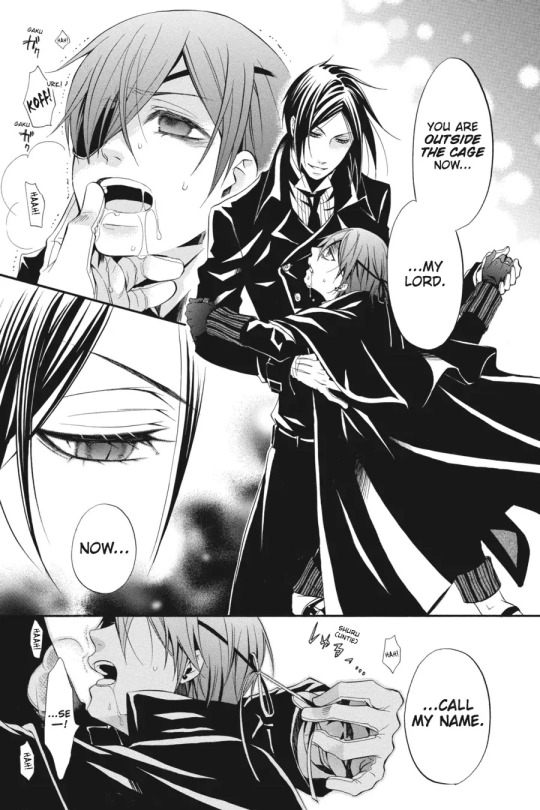
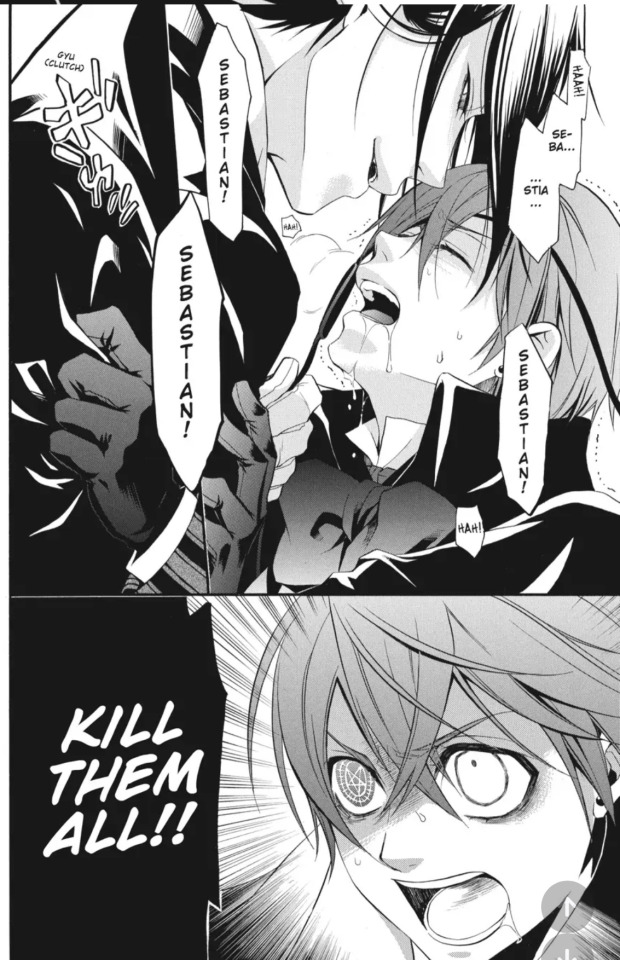
Ciel’s answer is to kill them.
A proper analogy would be to say that, if Sebastian offers a gun, Ciel pulls the trigger. They are both at fault. Sebastian, strictly speaking, is not here to directly cause Ciel’s downfall, but as a tool Ciel uses to plunge into the abyss.
If, again if, you were to frame Ciel as a protagonist, Sebastian falls closer to the “Voice of reason” character. Not a literal voice of reason, but a literary one. If you have a protagonist and an antagonist exchanging ideals, the Voice of Reason serves to engage with the protagonist on their own ideals.
That said, Ciel isn’t the protagonist. The story quickly falls apart if you interpret it as such.
Things such as Ciel’s character arc being…shall I say odd?
It’s not that his character arc isn’t there, but it’s never lineal. His goals stay the same, the only thing that happens is that we start to peel back the “why”s of his goals. Throughout the series it’s never about Ciel understanding himself better, he knows who he is, he knows what he wants, he knows why he wants it. He doesn’t ever need to uncover these, but simply remember them. Because it’s always about the audience understanding Ciel.
He knows he wants revenge.
In the Circus Arc: He knows that he needs Sebastian because without him, the pain of the abuse he suffered would be too much to bear. But WE are introduced to it.
In the Book of Atlantis: He knows that with this new lease he does not want happiness and peace, he wants revenge. The one being told this is the audience.
In Green Witch Arc: He knows that their revenge isn’t for his family, the real Ciel or guilt. It’s because he wants it. He’s angry, he’s upset, and this is entirely for him. The one being told this is the audience.
Except. Not really. The one either discovering or remembering these key moments - is always Sebastian.
Sebastian is the one who reassures him that he now holds the power of a demon to override the pain. Sebastian is the one who remembers that to override that pain, Ciel wants revenge. And Sebastian is the one who discovers that that revenge isn’t built out of grief or guilt, but for himself.
We are witnessing it all, through the eyes of Sebastian.
This is why we have an extremely vague idea of who Ciel is, Sebastian does not have the whole picture.
If you haven’t been reading this manga with your eyes closed, you’ll realize we have a better grasp at Sebastian’s character than that of Ciel. We get a lot of insight on how he thinks and what he values through light hearted dialogue he has with the servants. You even see the character development in these little interactions.
Think about how when he first arrived to the mansion he magically created food with no regards to taste, but when he meets Bard he states that food is created to see whoever will eat it, smile.
That is character development, more than you will be able to see from Ciel.
Because Ciel’s character, while not static, doesn’t go from point A to point B. Mostly, cause it doesn’t need to. He went through that when he lost the real Ciel and got Sebastian. Everything we are watching is the falling out.
Now, given the fact that I’ve told you that it makes more sense for Sebastian to be the protagonist/main character, and that he 100% isn’t either a villain or antagonist in ANY of the interpretations you can get:
Do you believe me?
If you don’t, you’ll probably believe Yana herself.
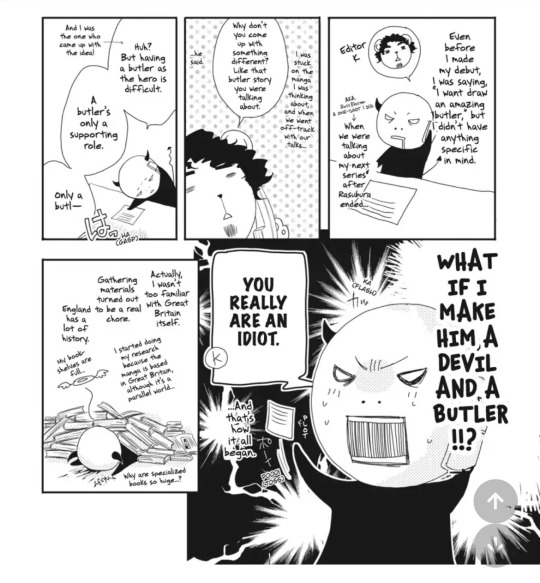
This is from the first Volume, where Yana herself describes the process of making Black Butler. The primary idea behind the creation of BB was a butler as a “hero”.
If you go back to the introductory chapter, you notice that Ciel is barely mentioned. He’s simply the one to give Sebastian impossible tasks and standards that Sebastian must find how to overcome.
Ciel is properly introduced until the NEXT chapter. The second chapter has this formula too, introducing Lizzie as a problem to overcome. Although, to Sebastian the best way to “get rid of the problem” is simply to indulge her.
The issue here being that the problem isn’t as simple as a business meeting but something directly tied to Ciel and Ciel’s past. Each time that Sebastian has to solve a problem, it chips away at Ciel. While with Lizzie he shows a persona, once he’s alone with Sebastian he acknowledges the toll it took on him. It serves to build Ciel as Sebastian’s master, and how some problems aren’t as simple as discarding a tablecloth.
The third and the fourth, are a unified narrative, with a similar premise to the first chapter. Ciel gets kidnapped and Sebastian must find a way to retrieve him without raising suspicions.
If the first chapter is to set up what Sebastian must do as a butler, the third and the fourth serve to set up what he must do as a demon.
The entirety of the volume, and up to Book of Circus Arc, is about how Sebastian tries to follow the increasingly absurd orders that Ciel has - it is not about Ciel trying to solve them.
That’s how they work, we follow Sebastian for the most part, because he’s the one having to come up with the solutions.
If anything, in early Kuro, where the emphasis was more on a slice of life conflict, Ciel is the antagonist. He’s the one creating problems for Sebastian to solve.
What’s more, in the second volume, the very first chapter is one from Sebastian’s POV. So far, we hadn’t gotten an entire chapter from Ciel’s POV. In fact, I would find it hard to point to a single chapter where Ciel is the POV throughout. The reveal of real Ciel and the flashback is the closest contender.
But once we move past early Kuro, and into Book of Circus, this set up changes.
It’s fairly easy to assume that Ciel is the main character, because from this point on the conflict of the plot sorta surrounded him. We spend a lot of time with him and with his story. The enemies start being people directly tied to Ciel and Ciel’s trauma. Rarely, if at all, we get to see Sebastian before he met Ciel.The framing device for the story, is Ciel.
This is where point 2 gets intertwined.
2.- Sebastian and Ciel’s relationship IS the story.
The story begins at the point where Sebastian and Ciel met. Who Ciel was before he met Sebastian, informs why he’s the way he is when he does. You have to know all he went through to understand why he’s a brat, why he lashes out. However Sebastian’s past doesn’t matter…because Sebastian himself doesn’t care much for who he was, before he was “Sebastian”. That’s also part of the narrative.
Unlike Ciel, he doesn’t seem opposed to revealing information from before the contract. He talks about how pets from where he is from are gross, he talks about how he knows how to dance because of other places he’s been to, and alludes to the life he's lived before.
Just that, to him, they're footnotes.
He makes allusions to a very bland, uninteresting life, up to the point he meets Ciel.
That’s why we don’t know more about his past.
As for why we focus on Ciel’s story…okay maybe we need Creative Writing lessons 102
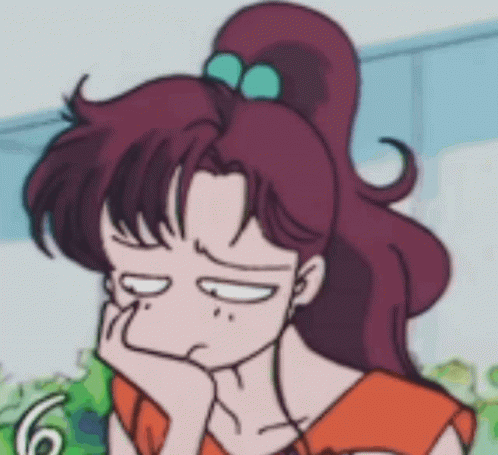
I studied Dramaturgy for about 3 to 4 years. And something you notice is how play-writing is the quintessential story telling. It’s making it work with the bare bones of a story.
Some other mediums have more finesse, more depth, or more spectacle - all amazing things that work for whatever they’re created for. But understanding a play, how and why it works, helps understand the fundamentals of any derivative story telling medium.
Particularly, conflict.
Conflict is dialogue and dialogue can take many forms. A story, in its essence, is a dialogue between two opposing ideas.
Take Batman, for example, who embodies the ideas of justice and order. On his own, he’s not a well rounded character.
If you ONLY present him, in a vaccum with nothing else, you don’t have a character. You have a list of characteristics that you’re supposed to know.
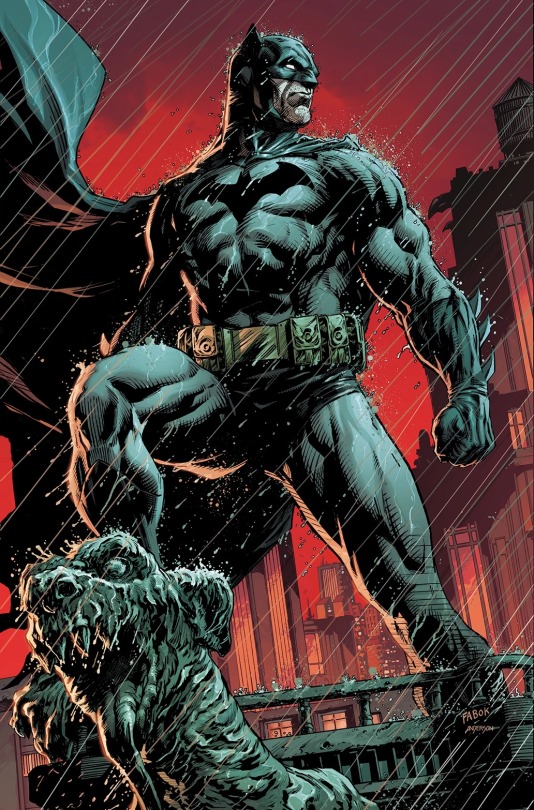
You only know who he is when you have dialogue with another character.
I say Dialogue, but it doesn’t necessarily mean spoken language at one another. Dialogue can mean fist fighting, playing tabletop games, talking to other people about the other, or even just a competition. The idea is to simply to compare and contrast both ideas.
If you want an example on how tabletop games serve as dialogue, watch the video “Well, Someone Had to Explain the Liar’s Dice Scene” by Lord Ravecraft
Another example, were we to retake Batman, you have him fight Joker. Who’s the embodiment of chaos and randomness.
In the following picture, you get far more information than the one previously shown. While the Joke fights with daggers and fake guns, Batman only uses his fists. He doesn’t use the tricks that Joker does. His serious demeanor, contrasted with Joker’s glee at the dangerous situation. The fact that Batman has a deathly grip on Joker’s shirt, while the Joker doesn’t, which shows a desperation to catch him.
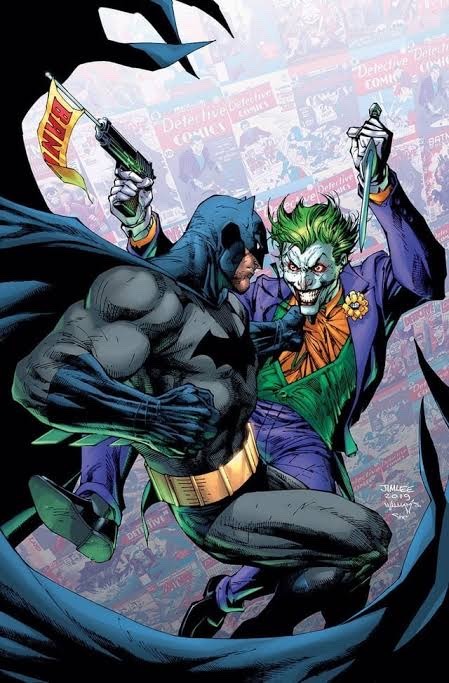
You are being shown, through a dialogue, who Batman is.
It’s so much easier and much more effective to explore a character through another character.
This is the reason why Shonen has a tendency to make incredibly good gay ships. If you want to explore Naruto’s personality, and his feelings of inferiority, you HAVE to have him interact with Sasuke.
If you wanna understand Hinata’s passion for volleyball, you have him enjoy himself the most with the only other crazy motherfucker who’s as obsessed with volleyball - Kageyama.
And I think that originally, Yana had this problem.
Sebastian was the protagonist, but she had little room to develop him as a character in the confines of the manor, dealing with random enemies.
She likely tried to create Grell as someone of the same stature as Sebastian. Someone who could be this other person to engage dialogue with and show or allude to his past a bit more.
The problem being that Sebastian didn’t care for his past. Or really, engaging with anyone. He sees everyone as below him, but when confronted with Grell who isn’t below him, he doesn’t wanna talk to her.
So you’re stuck in conundrum.
How do you have dialogue with a character, that as a character trait, doesn’t really wanna have dialogue?
Well, Grell also solves the problem. Because only the moment she gets him to start any semblance of a dialogue - is questioning why he’s serving Ciel.
And this is the moment when it’s perfectly cemented that the focus of the story is their relationship.
Why is Sebastian here? Why does he stay? What did he see in Ciel that made him want this extremely convoluted contract?
THATS the dialogue.
THATS the conversation we’re having in Black Butler.
We need to know Ciel because understanding who he is, let’s us know WHY /Sebastian/ is here.
Then slowly, with the introduction with the Undertaker, we find out Sebastian’s conflict.
Which is…
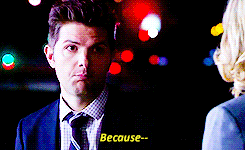
He’s scared of losing Ciel. It becomes apparent with the constant imagery of the Undertaker taking away Ciel and at some point even obtaining r!Ciel’s body, that he’s worried it might happen.
But he can only be worried that Ciel might be taken away if he wants to stay near Ciel.
And that’s his character arc.
Realizing that he actually likes Ciel, cares for him and the role he plays a butler that he doesn’t want this to end.
In the first chapters, he doesn’t feel a need to protect Ciel anymore than what’s strictly necessary. Just don’t die, that’s about as deep as his involvement in chapter 4 gets.
But by the Green Witch Arc, he feels a need to protect Ciel from ANY harm.
This is why I also said
3.- Their relationship is fundamentally a positive one.
In broad strokes, Sebastian to Ciel is the person who allows him to survive. He’s not worried about giving up his soul since he’s already dead. While Ciel to Sebastian, is someone who’s making him have fun. He’s slowly becoming more and more attached to Ciel and the life he has with Ciel.
Their relationship is not that of just a predator and prey, but also of master and pet.
In the terms that Black Butler itself would call: Sebastian is a wild wolf acting like a collared dog.
Ciel is aware that the wild beast will eat him at the end of the day, but if he clings hard to leash for now, he might just be able to have Sebastian maul his abusers.
Sebastian as a dog, currently finds that he enjoys being a chained dog.
(This is demonstrated in the Green Witch arc where he quite literally says, he doesn’t wanna be a wild beast and prefers to be a butler)
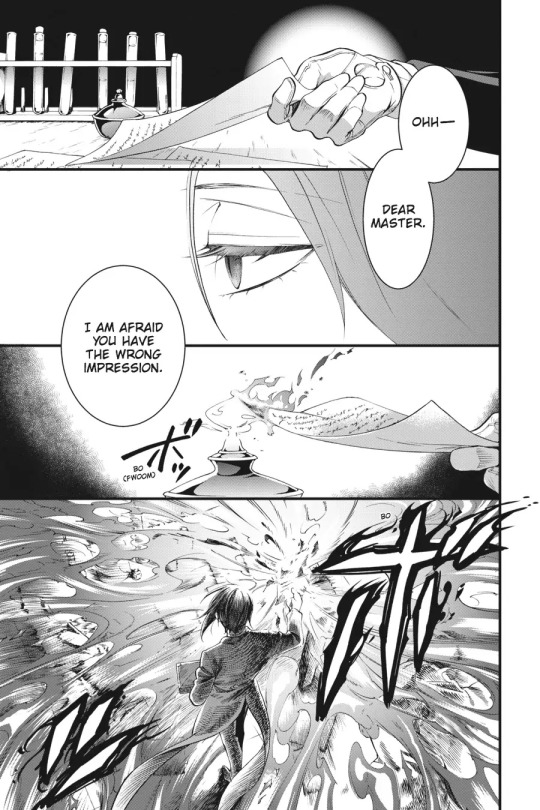
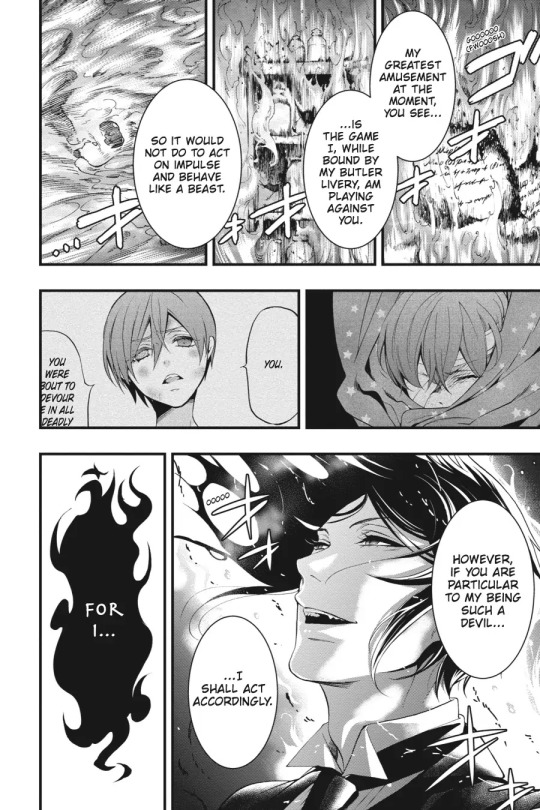
And much like the actual DOG Sebastian, Ciel constantly interprets his attempts to get close and protect him, as an act of aggression.
This push and pull of Ciel’s perception of Sebastian and Sebastian’s true motives is what feeds the story.
And the briefs interludes were that isn’t the case (what other people call the “plot”, but I would refer to as the connective tissue) such as Sullivan and Wolfram, the other servant’s past, the grim reapers and the like, serve as a parallel to Ciel and Sebastian relationship. Either to signify how they care for each other, highlight their weaknesses or fears, or explore how they feel.
It’s no surprise that Sullivan and Wolfram are parallels to Ciel and Sebastian. A sheltered sickly child who seeks the protection of a cold hearted machine that only knew how to kill, but who eventually found he cared for her genuinely.
Undertaker and Claudia’s relationship being heavily paralleled with them, even though we aren’t 109% sure what they had but heavily implied it was a romantic attraction from the undead supernatural creature and a Phantomhive.
Everything is a parallel.
That’s why, like the approach of the terrible original video, is flawed.
Trying to interpret Black Butler as action scene after action scene, with mystery after mystery with the only connective tissue being the mystery of who burned down the mansion - is missing the trees for the forest.
That’s not the point.
And if you’re too much of a prude to engage with gothic horror in its gothic horror game, I see little point as to why you even bother to engage with it at all.
A lot of people, including the person who create the video, simply refuse to acknowledge Black Butler IS the story of Sebastian and Ciel as a close and positive relationship, romantically and sexually charged. The reason for it being that they’re “put off” by it.
Part of me wonders how much that is genuinely true, and how much is just performative outrage. It’s like ignoring the fact that Cersei and Jami are in an incestous relationship and try to frame it as “platonic love”, because the idea of it is THAT off putting.
But regardless of that, if you don’t like the fact that it’s as canon as canon can get, I would reccomend you don’t engage with the story at all.
As I’ve explained, the entirety of the series is about them. If you refuse to see Sebastian and Ciel as, at the very least, a duo that cares deeply for the other - you aren’t reading Black Butler.
I have no idea what you’re reading.Perhaps your own biases and subconscious stigma with British aesthetic. At that point, watch the fucking British Royalty Gossip Magazine. You’d find more substance there.
Just don’t be like the person in the video, please? Don’t play dumb. Don’t ignore the fact that Yana is a Shotacon, don’t ignore the fact Sebastian is a hero, don’t ignore the fact that the entirety of the story is based on Sebastian and Ciel’s dynamic.
Because if you do, you are ashamed. You are ashamed of what this story is about. You don’t wanna engage with the text, you want to engage with yourself. You wanna project into Ciel whatever traumas and experiences you have, for the sake a vanity project, where you come out as the morally superior.
You don’t wanna talk about Black Butler, you wanna talk about how good YOU are. How you “don’t sin” by watching it “without all the gross unholy stuff”.
Which is the exact opposite of what BB is about.
So, if you don’t want to, save us all the humiliation fetish and leave.
512 notes
·
View notes
Text
Hey by the way Kabru spoilers time
Cuz I just noticed something about his explanation of the dungeon’s growth
He’s fucking wrong
He’s completely fucking wrong about all of it
It’s so logical, it sounds so sensible, it’s such a clear chain of cause and effect… but because he doesn’t know about the demon, he’s completely wrong about how any of it works
Kabru’s Theory of Dungeon Maturation:
1) dungeon is found
2) adventurers go into dungeon and find treasures
3) treasures run out (shitty people ensue?)
4) adventurers leave
5) monsters breeding in the dungeon overwhelm the surface
However, from the Canaries, who are demonstrably shown to have far greater knowledge of the dungeons and the demons (fucksake Milsiril you shoulda told the boy), we have this:
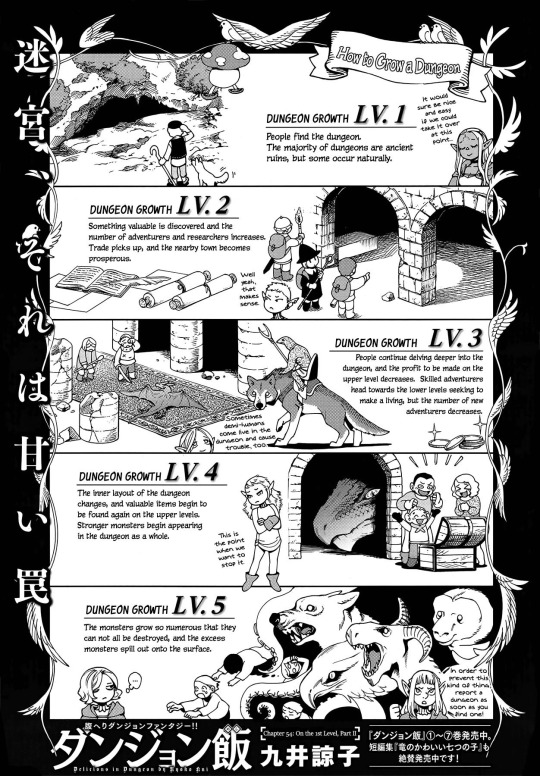
Here we see the explicit gaps in Kabru’s knowledge
1) people find the dungeon (yup)
2) people find something valuable in the dungeon, adventurers ensue (pretty much)
3) less treasure on the upper levels leads to less adventurers (yup and here’s the major change)
4) new layout, MORE treasure on upper levels and subsequent increase in adventurers, supplied by demon, also bigger and better monsters (has no reasonable explanation outside of demon funding, no wonder he didn’t get it)
5) monsters overpopulate and break out to the surface; presumably as part of the demon’s overall world domination plan
More people in the dungeon does feed the demon and the dungeon itself, but not in the way Kabru expects; it’s the desires of those people that make the difference, not the people’s presence or energy
Emptying the dungeon won’t fully starve it, especially not with groups already on the lower layers ready to take over, but it is actually very effective for what the Canaries want - the big crowd attracts the dungeon lord’s attention, Kabru trying to empty it brings those selfish desires to the forefront, and less civilians in the way is always helpful (once they’ve served their purpose)
He’s so fucking close, and his explanation makes so much sense, but that one key missing piece about the demon (and the renewed treasure) means that his own efforts to prevent level 5… are meaningless
Killing the people who take advantage of others isn’t going to change that the dungeon will lure people deeper, feed on them, and then overwhelm any defences
The monsters don’t spill out because there’s a number of adventurers that needs to be maintained to keep them under control; they’re not breeding naturally, they’re coming from an infinite Monster Tap the demon pulls whenever it wants to
All Kabru is doing by trying to keep the number of adventurers up is actually feeding the dungeon more and more of their desires; now, it’s not like he has a consistent plan to do this, but since it’s his motive for murder it’s pretty funny that he’s so wrong
And that his firm and devoted desire to rid the world of monsters would make him extra delicious to the demon
His whole overarching purpose is to understand the dungeons so that they can prevent more of them from being created, to get the answers that the elves and dwarves and gnomes aren’t sharing…
And that being underpinned by having one single key piece of information knock his whole strategy off course is just. Chef’s kiss
He’s really lucky Laios had a big ol’ Protagonist sticker slapped across his titties and a far more complex and nuanced set of desires which monopolized the demon’s attention
#delicious in dungeon#delicious in dungeon spoilers#dungeon meshi#dungeon meshi spoilers#kabru of utaya#kabru dungeon meshi#like i love him he’s doing his best#but that one key piece of info man#dunmeshi spoilers#dunmeshi meta
160 notes
·
View notes
Note
hii !! i luv ur works sm, so i was wondering if i could request a ot7 (i think thats it, with like the individual members ? ) about a reader who has curly hair. but tysm for reading my request !
riize with reader who has curly hair
note; thank you sm <3 this was a bit challenging to write as i didn‘t really know how to approach this, but i hope u still like it !!
⊹₊˚✩ ₊˚⊹
✶ shotaro
learns all about curly hair; takes the initiative to educate himself about curly hair techniques, products and routines to better understand and support your hair needs. he knows how complex curls can be so he does all that to help you feel less stressed about them. will always tell you something new he learned about curls (⸝⸝ᵕᴗᵕ⸝⸝)
✶ eunseok
regularly compliments your curly hair; expresses appreciation for its natural beauty and uniqueness, tells you to not straighten your hair too much because you’re only going to damage it and your curly hair is what makes you you. encourages you to to embrace your natural hair. never fails to make you feel good about your curls ʕ•ᴥ•ʔノ♡
✶ sungchan
bedtime hair routine; helps you with your nighttime hair routine, gently detangles your curls and helps you brush them. softly massages your head after you’ve done the routine because now he wants you to relax and enjoy being in each others presence. also gifts you curly hair products so it’s easier for you to do your routine (∗˃̶ ᵕ ˂̶∗)
✶ wonbin
helps you style your hair; whether it’s helping to detangle, applying products, or even learning how to create simple hairstyles. tells you which hairstyle would go best with your outfit. he also lets you style his hair and sometimes asks you to braid it (if it’s long enough) so he can have wavy hair to match with your beautiful curls ^•ﻌ•^ฅ♡
✶ seunghan
surprises you by doodling characters with curly hair on love letters; sometimes he even attempts to draw you with your beautiful curly hair. he also leaves little notes around the house, each expressing his adoration for your curly hair in creative and heartfelt ways ♡・ᴗ・`♡
✶ sohee
curly hair themed cooking night; you have a cooking night at home, where you prepare curly-themed dishes together such as pasta with curly noodles or curly fries, while playfully comparing your culinary creations to your curls. the night ends with the two of you watching a movie with a protagonist that has curly hair as well ૮꒰⸝⸝> ̫ <⸝⸝꒱ა
✶ anton
a curly hair scavenger hunt; he organizes a scavenger hunt around your city, with clues leading to places that hold special memories for you. at each shop, he leaves a small curly hair related gift or compliment for you, adding an extra layer of sweetness to the adventure ◝(ᵔᵕᵔ)◜
#riize#riize imagines#riize wonbin#riize anton#riize sungchan#riize scenarios#riize eunseok#riize shotaro#riize sohee#riize seunghan#park wonbin#lee sohee#anton lee#osaki shotaro#song eunseok#hong seunghan#jung sungchan#riize x reader#wonbin x reader#shotaro x reader#sungchan x reader#anton x reader#sohee x reader#seunghan x reader#eunseok x reader#riize fluff#riize drabbles#riize oneshots#riize fics#sumi‘s requests ೀ
192 notes
·
View notes
Note
okay so here is her review:
https://arkadymartine.wordpress.com/2015/09/27/the-traitor-baru-cormorant-a-reviewresponse/
admittedly its from 2015- i haven't poked around to see how she may have changed how she feels about it, and i know she did blurb seth's recent scifi novel (Exordia), so there's no bad blood there or anything. it's also a positive review, in general- she ends with this sentence: "I highly, highly recommend this book; I have not thought so much about something I read in a long time."
i am also coming into this as someone who has read all of seth dickinson's work for the game destiny, where he was near-singlehandedly responsible for a good oh… 80% of the interesting women (& overall interesting concepts lol!) in the game, and his writing of one of those characters in particular as a complex and flawed character got him bullied viciously off of all social media. if you've tried to find his social media presence and havent found anything, that's why. so i mayhaps have a little more emotion in the game.
THAT SAID. here are some specific parts from her review i find really fucking annoying! and color the way i feel about Memory & Desolation, despite them being so incredibly targeted at me as a classics person AND someone who fucking loves the specific sub-genre of scifi her novels are.
"[Traitor] asks a question which I find compelling as a student of an empire and as a queer woman. That question is: what do we gain by complicity? What do we – we barbaroi, we women, we queer people, we imperialized – what do we get when we say yes? When we say yes I will hide my true nature? When we say yes I will subsume myself into the beautiful machine? When we say can we speak English? Or the literature I love just happens to be written by straight white men – and mean it, too, mean it with the kind of depthless love that a person can have for a text that speaks to them, which holds up a mirror to them?"
i dont think the use of the greek word for barbarian does anything here (she also keeps coming back to the greek term orthos in her review, which also pisses me off lol), i dont think empire is a "beautiful machine," and i don't think the invocation of identity politics is useful. like. i know she's a byzantine scholar but if your first association with empire is purely a finite Historical Empire instead of, like, modern US imperialism, or British colonialism, you are going into this discussion with a certain set of values and opinions! a set of values and opinions that let you call an empire a "beautiful machine" in all earnestness. this claim probably seems unsubstantiated and nitpicky now just from this excerpt but ill come back to it with more i promise. on the idpol front, she also says immediately after this that she does believe that straight people can and should write queer people, but that they should listen to queer people when they point out those errors. she then continues:
"But then, critique: there are two points on which I think Dickinson’s portrayal of a queer protagonist has faltered, and I think both of these errors arise from the fact that he isn’t part of – as far as I know at the time of writing this review – a queer community.
Firstly, I disbelieve Baru’s awareness of her own desires… …For the first portion of the book, her queerness felt more like a character trait assigned to her for reason of plot than a naturally built part of her as a person…
Secondly, I wonder where queer people in Falcrest are…"
theres more to these excerpts, but. i personally didnt find the depiction of baru's desire to be unrealistic, and also this was a review of Traitor, specifically, so where on earth would baru have heard about queer people in falcrest? and more importantly, why should we care so much about queer people in the imperial core? moreover i think the way seth does it with svir is very very well done, and illustrates the hypocrisy of empire in a way that does NOT seem like what martine is asking for here!!!
"Why am I invested? I myself am a student of empire. I’m a Byzantinist. My academic work is about empire and its seductions; it is the animating principle of my professional life. And: I am myself someone who loves order over disorder. Who looks for systems in all things. Who is comforted by structures; who is concerned deeply with propriety.
But here’s my real criticism of this book: I don’t buy the seduction of the Masquerade. And I think if this book fails, it’s there: in that its empire is too easily read as undesirable. As profane, unethical, fundamentally wrong. It is really overtly evil."
…
"The Masquerade isn’t civilized. It’s civilization, but I don’t recognize it as civilized, and this is a problem with a constructed empire. An empire relies on itself as the definition of civilization – I would footnote here Ann Leckie’s Imperial Radch as a SFnal example of an empire which is built on this principle, and which, for this reader at least, achieves the facsimile. (But then my ancestors were not enslaved, we were exterminated; not annexed, but exiled. Perhaps I like the Radch better than the Masquerade because I can find a place for myself in it, and cannot imagine a place within the Masquerade someone like me would ever be safe –)"
and THIS. THIS RIGHT HERE IS MY BIGGEST PROBLEM. critiquing the masquerade as not "seductive" enough, calling it too evil to have people join it- how does someone miss the point THIS badly??? like. are you FUCKING serious??? how do you read a book about the immense violence of colonialism and your problem is that it is boohoo too violent for people to join willingly. google literally fucking anything the US has done ever!!! and the invocation of the concept of "civilized" as an objective quality, despite the recognition that the empire constructs what counts as "civilization" is so fucking unserious/simplistic/juvenile! why do you need to imagine yourself a place in the empire? in the imperial core specifically!
and i think this particular approach bleeds into her books. i read them at Least 2 years ago, so this is mostly vibes-based, and i will avoid spoilers.
there is such a focus on the allure of the imperial core, on the "beautiful machine" of the empire as she calls it. there is violence done, but it is abstracted away from the wealth of the imperial core. there are no economics there. the empire sees her independent station as a backwater, and there is some cultural tensions there, but there is no realistic violence and exploitation! it is not clear at all what maintains the empire, besides some abstract idea of trade. i also don't know what her Point is with the naming & language conventions, which are very clearly inspired in part by ancient Mayan- e.g. the empire and core planet are called Teixcalaan. and idk this may be reductive of me but i think if you are going to pull features from civilizations that have been colonized and use them to inspire fictional colonizing forces, you ARE saying something there! idk! and like, the ancient Mayan
and on the ~representation~ front, i also don't think she does a better job than seth tbqh!!! i felt like the characters getting together came out of nowhere and felt anticlimactic- there is also not the tension i think there should be with the main character being an ambassador-ish and the love interest being… idr. junior intelligence officer iirc? idk! and for all her critique of baru's desire for women not feeling "real" or present enough, i do not remember the main character in Memory having any real focus on it!
i enjoyed Memory just fine, but i don't think it says anything interesting or novel or even critical about empire, and i found her review of Traitor extremely shallow and useless, if very revealing about her own outlook on empire lol!!!
this has been at best Minorly proofread and edited but im not like, writing an academic essay on the matter and so i apologize for any inconsistencies.
oh man thanks for this this is really interesting. i went and read the whole thing and i agree a ton with your critique. i'm going to stick my thoughts below the cut because i went on for a bit here, in typical fashion.
i personally didnt find the depiction of baru's desire to be unrealistic, and also this was a review of Traitor, specifically, so where on earth would baru have heard about queer people in falcrest? and more importantly, why should we care so much about queer people in the imperial core?
NO BUT EXACTLY... for starters this is explicitly a novel about colonized people taking place in a colony where none of the major characters are from the empire. where, when, and how would we take the time to explore what queerness looks like for them and more importantly, like you've asked, why the hell should that be a priority for the narrative in this case.
in terms of 'i found this to be an unrealistic depiction of queer desire' 9/10 times i feel like what that means is 'i found this to be an unrelatable depiction' which is an entirely different critique. i know i'm working with two additional books worth of context that martine isn't working with here. but even taking into account just the characterization we have for baru in traitor i think this is suuuuch an unfair complaint. i'm gonna pull the entire quote she says about baru's sexuality here because i have additional specific gripes with it.
Firstly, I disbelieve Baru’s awareness of her own desires. In the first portion of the book, I do not ever feel the weight of Baru’s own awareness of her sexuality; there is an absence of carnality, a kind of intellectual version of lesbian desire which is, to me, inconsistent with the sort of desire I expect. Not until the introduction of Baru’s eventual lover Tain Hu do I get a sense of Baru as a woman who loves women. Further, considering how very much the Empire of Masks and Increastic philosophy criminalizes the sin of queer desire, I wish Baru had struggled more with the nature of her desire. For the first portion of the book, her queerness felt more like a character trait assigned to her for reason of plot than a naturally built part of her as a person. This markedly improved in the second half, where Baru notices women in a way she does not notice men.
For starters, it is insanely hypocritical to me to complain that her desire both isn't carnal enough and she processes it too intellectually, but that she isn't struggling enough with it. Baru intellectually processes things! That's her entire character from the getgo! She also has a difficult time conceptualizing other people as fully realized beings with their own agency. These character traits paired together don't make for a particularly passionate and carnal relationship to her sexuality. She is also, at her absolute oldest in this book, 21! (Or 22? I can't remember. I know she spends 3 years in aurdwynn) and has spent her entire youth being groomed to be a scholar. Of course detached intellectualism is her primary way of navigating all things. Why wouldn't it be?
Baru primary motivation is to save taranoke, she wants to save the taranoki way of life, and part of that way of life includes an acceptance of nonhetero nonmonogamous relationships. Sure, a different character arc may have involved baru actually internalizing and then having to break free of the trappings of race, gender, and sexuality that the empire tries to impose upon its citizens. but that's not baru and acting like this is a writing flaw rather than a character choice is insane to me.
There's absolutely no reason for Baru to lie awake at night pontificating about how wrong and dirty of her it is to want to have sex with women because we are never lead to believe even for a minute that Baru puts any emotional weight in incrasticism. She doesn't conceptualize it as sinful she conceptualizes it as illegal!
And "Not until the introduction of Baru’s eventual lover Tain Hu do I get a sense of Baru as a woman who loves women. " is killing me in particular because like. Yeah. Tain Hu is baru's first love. thats the point. But beyond that this is just not being able to see anything other than what she's looking for because i think the chapters covering baru's childhood make it pretty clear that her feelings for aminata and cousin lao (im not double checking the name but im pretty sure it was this) are deep and strong. the fact that they're not as explicitly and straightforwardly romantic and sexual as her relationship with tain hu doesn't change that, and in fact, points to baru's struggle with/development of her sexuality that she claims was somehow missing in this book.
like i just simply can't see anything here but someone who is seeing an emotional landscape they can't relate to and assuming that means it's flawed writing. skill issue frankly.
She's also fucking insane for acting like the masquerade is too cartoonishly evil to be appealing. once again im going to post her full quote here because i think its important to see
its empire is too easily read as undesirable. As profane, unethical, fundamentally wrong. It is really overtly evil. It punishes sexual “deviants” with mutilation and death. It murders children callously. It inflicts plague and withholds vaccines. It lobotomizes its own emperors for the sake of convincing its populace that the emperor is just. Most of all, the Masquerade is a eugenicist empire: it is explicitly founded on not purity of bloodline but on purification of bloodline, on making people useful to it. It makes people: it breeds them carefully, it indoctrinates them through schools, it uses drugs and operant conditioning to transform their minds and make them into automata tools. It commits every atrocity that a modern Western reader recognizes as abhorrent. This is a problem. It is a problem because we are asked, as readers, to believe that there are reasons besides blackmail that a person would willingly become an agent of the Masquerade. We are asked to imagine that the Masquerade is a beautiful machine.
for starters. "It commits every atrocity that a modern Western reader recognizes as abhorrent." MODERN WESTERN EMPIRES DID, AND OCCASIONALLY STILL DO, MOST OF THESE THINGS!!! THIS IS US! WHAT ARE YOU TALKING ABOUT!!! I FEEL INSANE!!!!
I think the book makes it more than explicitly clear why the empire is appealing??? it has all of the capital???? its building schools and sewage systems and importing food and goods and teaching reading and writing??? baru's own internal narrative often shows her own strife at the fact that the empire has made genuinely incredible scientific advancements that offer significant improvements in quality of life to many, many people. martine actually acknowledges this in the next paragraph of her review, and then brushes it away as not being good enough. why? what about that doesn't convince you?
she is seeming to hugely ignore the fact that in the case of aurdwynn specifically, the bureaucracy of the empire is coming in to unseat feudal aristocracy! what the masquerade offers may not be particularly tempting to most of that ruling class, but its economic opportunities are more then believably appealing to the common people. i think this is made pretty clear when baru's ploy to use the fiat bank to make loans to the aurdwynni people and basically lessen the massive tax burdens from the duchies wins her huge favor with the public.
and frankly even for the ruling class the potential economic benefits are massive too if you're willing to participate in the empire properly. yes the empire doesn't have Moral appeal. it doesn't fucking have to. it owns pretty much every economy outside of the oriati mbo. the fact that that's not enough for her is as you've pointed out really really showing her biases and blind spots. 'no reason besides blackmail' MONEY!!!! MONEY! IT'S MONEY! THIS IS A BOOK ABOUT ACCOUNTING! HOW DID YOU MISS THAT!!!
and the invocation of the concept of "civilized" as an objective quality, despite the recognition that the empire constructs what counts as "civilization" is so fucking unserious/simplistic/juvenile! why do you need to imagine yourself a place in the empire? in the imperial core specifically!
And this is really it for me too, yeah. It's gross. It's absolutely gross. "An empire isn't believably appealing unless I, personally, find it appealing" there are people alive who are eugenicists, who love community policing, who believe in race science. the masquerade is an empire for them. the thing about empires is that they are only actually empowering for an incredibly small subset of people, and the fact that You, Specifically, Arkady Martine can't imagine being one of those people in this instance doesn't make it not believable. This is a shatteringly individualist way of engaging with a work.
As for your points about the way she handles empire in her own book obviously i can't have anything to say there because i haven't read it yet, but i do absolutely agree with you on this bit:
and idk this may be reductive of me but i think if you are going to pull features from civilizations that have been colonized and use them to inspire fictional colonizing forces, you ARE saying something there! idk! and like, the ancient Mayan
1000% i don't think this is reductive of you. whether or not you're consciously saying anything is one question but it's a choice that absolutely doesn't exist in a vacuum. out of curiosity i googled her to see if she was of mayan descent or anything and maybe she chose that due to some personal ties to the subject matter but she doesn't seem to be. which of course i don't think means she can't or shouldn't draw any inspiration from there but i do think all of these sorts of choices are meaningful
i don't really have much to say here to round off a conclusion but. wow. deeply deeply telling review that does not particularly make me want to read anything she has written beyond this.
70 notes
·
View notes
Note
Hello! Apologies for sending an ask out of the blue but considering your familiarity with localisation differences in persona 4/golden, I was wondering if anything comes to your mind regarding this aspect and how the game depicts queerness and queer themes? Thank you!
Heya! Don't worry, I was thinking people would probably ask stuff like this. After all, I already replied to somebody's tags asking this same thing previously, but I know not many people saw that, so let me use the chance to go into more detail:
Unfortunately, Persona 4's treatment of queer themes is not a result of the translation. The only things that were down to translation choices were small things, such as which pronouns are used in which situation (because Japanese does not at all have the same concept of third person pronouns as English, and the way first person classifiers that mean "I" work is very complex and a lot more vibes-based than actually tied to gender.)
But for the most part, everything is pretty much the same. Kanji's reaction to Chie mumbling about something being "off" about how he interacted with Naoto that first time, the tent scene, Yosuke's extreme insecurity in his own sexuality in addition to everyone else's... I think maybe the only thing that's a biiit better in Japanese is that Teddie is kiiinda genderfluid in Japanese, with the artbook outright stating that he doesn't necessarily consider himself "male" when he's in his bear form, unless it's necessary for a joke.
A lot of this can be traced to the really odd relationship the game's director, Katsura Hashino, has to queer themes. In interviews about Catherine Fullbody (a game which infamously has a rather weirdly handled gay romance route which, however, is notably also the only romance route in the game that cannot possibly result in a bad ending), he talks about how he's always admired queer people for being "strong" and wanted to write queer stories, but couldn't really do it until Fullbody because Atlus higher ups were afraid of backlash from the fans.
Traces of this are actually seen in Persona 4 Vanilla's data, where remnants of a surprisingly well done romance route for YOSUKE, of all people, are still present. That route made it far enough into development to have voiced lines in both, English and Japanese. However, it was dummied out in the final game and its script content was removed. Yosuke STILL has the "girlfriend flag" in the code that all the female romance options also have, but in the finished game it only checks whether you can hug him during his social link or not. Everything else was dummied out. You can still find the voice files on the cutting room floor if you want:

And yes, the "I like you" line is unambiguously romantic in Japanese. His wording is very hard to misinterpret.
However, in the finished game and the rest of the franchise Yosuke's bisexuality was reduced to an in-joke of the developers. It's most poignant in Persona Q (the first one), where if you get the "marriage" scene with Yosuke in the second dungeon, his reactions differ WILDLY depending on which Protagonist you are playing as, far more than other male characters. With Makoto Yuki he acts nonchallant and deadpan about it. With Yu Narukami he acts like a blushy Tsundere and panics constantly. So, yeah.
Okay, so, if the director had interest in writing queer stories since before Persona 4, why is Persona 4 the way it is then?
Well, because - and there's no way around it - he sucks at it.
Katsura Hashino has to be one of the clumsiest "gay activists" I've ever seen in my whole darn life. He finds queer people "cool", but seemingly never had any queer writers or sensitivity readers on his teams and it's caused enormous blunders in how these themes have been handled. For example, when after Persona 3 it was pointed out to him that the writing of the female characters in interaction with the male characters was bad, he immediately hired more female writers and gave them free reign for how to handle the female characters from then on out. But apparently the same thing never happened with his mishandling of queer themes. He wants Catherine's Erica and Rin to be empowering figures for trans women and gay men, but makes a lot of blunders in how he has other characters interact with them to the point it buries his good intentions. Erica's boyfriend having gay panic upon realizing she's trans is treated as "funny and cute", even by Erica herself. Rin technically being a monogender alien really undermines his story of becoming more secure in his sexuality. It goes on and on like that.
The intention with Naoto's story was to point out the extreme sexism in Japanese society and how it forces female nerds to find alternate modes of self-expression, but the clumsy choice of including surgery themes in Naoto's dungeon completely buried that for especially western queer audiences. Most people don't even remember Naoto's dungeon was outright modeled after a Kamen Rider villain hideout. They completely shot themselves in the foot with this one. Additionally, the way Naoto is handled AFTER the dungeon makes her (I'm using that pronoun because she calls herself a "woman" in Japanese in the game) seem more like someone who's on the verge of discovering they are X-gender (the japanese word for "nonbinary") than a repressed girl. Like, right down to how she has Rise help her experiment with clothes in the canonical drama CDs only to realize she really is uncomfortable with skirts and go for an androgynous but less restrictive look going forward. The way she dresses in the Golden epilogue and P4D is pretty X-gender core if you ask me. If they had leaned into that they could have genuinely have had something AMAZING, while also presenting the themes of sexism they wanted to explore, but the lack of queer sensitivity readers kind of ruined it.
Same for Kanji. The way they write him makes it seem like he's bisexual or pansexual, rather than straight, but they kinda shove that part of him aside after his dungeon is done, leaving his actual orientation up in the air and wasting a really good chance for representation. NOW, given what happened to Yosuke's social link, it's quite possible the original intent WAS to explore this more and it got cut, but as it stands, we'll never know. The huge problem of the internalized toxic stereotypes his Shadow presented never being reflected on and put into their right context in the rest of the game, when his social link could've given a great opportunity for that is also a huge shame.
All of this happened because of Atlus being unwilling to let their writers go all out with queer themes in fears of alienating a cishet audience AND because Hashino never sat his writing team down with any actual queer writers to sort this shit out and learn how to get across what the team was ACTUALLY trying to say. Now, given, Persona 4 was far from the only Japanese media property with that exact issue at the time, but it hurts especially much in its case because of the game's themes of exploring the truth to its logical conclusion, as well as psychology. These are issues that a remake REALLY would do well to address and correct. I feel like they actually will HAVE to do that, because sensitivity readers have become the NORM in handling these themes now in Japanese media, rather than the exception. You can thank trail blazing mainstream works like Zombie Land Saga for that.
All in all, Persona 4's handling of queer themes is an exercise in frustration that I hope is corrected soon.
72 notes
·
View notes
Text
Keys to Crafting Characters Readers Will Root For (w/ some examples)
As a writer and while making up this blog, I’m quite adamant that characters are just as important (if not more) as plot. In the grand scheme of things, an active, relatable, and engaging main character is crucial for a novel's success. But how exactly do we make a character all these things? There’s many ways, in fact. It is up to us as authors to keep track and manage the developmental arc of our protagonist: primarily, who they are on the inside, and how they grow or change / adapt to the situations or people around them.
Here are some examples and tips to help you develop a compelling protagonist (or all kinds of characters). Keep in mind these tips are at their most basic, essential level (there’s just so much that can be explored in each one), so I hope to go further into each point sometime in the future.
~`* They have clear goals and motivations.
First things first: you’d want to clearly define your character's goals and motivations — and the sooner, the better. Proper and well-set goals and motivations provide a sense of direction to the narrative. They should be specific, measurable, and achievable — or perhaps, not achievable, at least to its fullest extent. This would ultimately depend on the type of arc or ending you intend to write for your story, but there should at least be some main goal the character is vying for, and a motivation that dictates how much they want or need it.
For example: An aspiring actress hoping to make it to the stage and audition for the lead role in her favorite play.
—> Why does she want to be an actress so badly? What does it mean to her to act in her favorite performance? What does she have to prove, to herself or others?
~`* They are flawed, yet relatable:
I’m sure you’ve all heard this before… but I’m still going to reiterate:
Your character should have relatable flaws that readers can sympathize with. It’s no secret that flaws make characters human and relatable. Flawed characters help us remember that nobody’s perfect, and that we’re not alone in our struggles and in our plights (stay back, Mary Sues!). These flaws can be anything, from fears, limitations, biases, misbeliefs, quirks, shortcomings, or behaviors. It’s useful two have at least two: a minor flaw and a major flaw, where the former affects only the only character and nothing else, and the latter hinders the character and affects the plot.
For example: A highly-knowledgeable yet socially awkward and oblivious professor who can hold a bar of soap better than a conversation.
—> Does this flaw make him out to be charming or weird to others? How can his social-awkwardness affect the plot… does it hinder him from connecting to his students or colleagues?
~`* They have unique talents or interests.
Sometimes I read a story, and personally I have a hard time connecting with a character if all they care about from beginning to end is what’s happening in the plot. It’s like they exist for the sole purpose of the plot, and are nothing but a shell to see through the events or its challenges. This is understandable, especially when it’s an action-packed story or thriller.
Personally, I can’t help but wonder what its main character does for fun. What they’re like before the events of the novel.
I think it can be useful your character skills or interests that set them apart. This not only makes them interesting, but can drive the plot in unexpected ways. *Bonus points if they have a particular skill or hobby that conflicts with the way they present themselves to others, or if they hide it well if they are embarrassed by it or afraid of getting judged. Essentially, this is all to clue-in on the reader to the character’s backstory, their personality. It helps them seem more individualistic, like humans with their own sets of interests or ideas that give them more complexity and uniqueness. This can also be useful in creating parallels or connections to your story’s themes or your character’s arc.
For example: A brave warrior with an aptitude for gardening and flower arranging.
—> Seems random, right? But what if this warrior had workin in their relative’s flower shop, and has kept the skill alive in their days of battle to see pieces of beauty around them, hope from fear and danger? They might dig graves of their fallen friends and leave behind flowers in remembrance. Just an obscure example, but see all the possibilities something like this can open up?
~`* They have deep, complex relationships.
Sometimes we can get a better idea of a character when we see them interact with the people around them. It’s like showing vs. telling, where we get a firsthand look at how the main character treats his family members, how he accepts or refuses help from those he’s close with, what he appreciates most about his significant other, how he feels about the annoying neighbor next door. Who’s the one person they most admire and never want to let down? Who’s the one person they despise with all their body and soul? Whether it's friends, family, enemies, or romantic entanglements, complex interactions and relationships add layers to your character and in how they showcase themselves to the world.
For example: An excellent, compassionate therapist with a strained relationship with his own family member.
—> How does this character feel about this kind of relationship? Does it stem out of shared family troubles, or something deeper? Is there a glimmer of possibility the therapist might reconcile with this relative, or are they dashed because of mutual pride or distrust?
~`* They often face moral dilemmas.
It’s time to get philosophical. Human nature is full of paradoxes and tough moral questions, and so characters with conflicting qualities can be intriguing and relatable. Introduce moral dilemmas and conflicting values that force your character to make tough choices and confront their conflicting values. Do they have a friend with conflicting beliefs that challenge their own? Are they forced to act a certain way because of external pressures? Are they forced to choose between saving one person while destroying another?
No matter how serious this dilemma is, you can also add a moment of clarity or self-awareness for your character. This can be a turning point where they acknowledge and confront the conflict within themselves, thus becoming face-to-face with their internal crisis and how they decide to go from there. Do they weigh the pros and cons considerably, do they fumble because they’re hesitant, or do they embrace the new changes?
Despite conflicting values, make sure your character's behavior is consistent with their established personality. Consistency helps maintain authenticity and keeps the character grounded.
For example: A scientist torn between protecting humanity and the pressure of making a groundbreaking discovery.
—> How does making this discovery very important to this character? What do they stand to lose… what do they stand to gain? Are they at the risk of becoming something completely opposite of who they were at the beginning of the story, losing their sense of morality or forced to choose a side?
~`* They show their quirks and habits.
Introduce quirks or habits that make your character memorable. These little details can make the character more relatable and interesting, because just like talents or hobbies, this can also give a clearer sense to the reader of what kind of personality the character has and what they’re like. Not to forget, it also helps them to stand out from other characters on the page, giving them a unique voice with their kind of dialogue, their behaviors, style, and mannerisms.
For example: A scholar who can focus only if she’s chewing gum or wearing her lucky ring.
—> How might’ve this character started this habit or tradition? Does it actually work? Does it not work, but they still do it anyways because it’s comforting for them? Also, where did they get this quirk from?
~`* They have a backstory.
Most of what we’ve been discussing in this post already leaves some framework for the character’s backstory. It’s important to have a meaningful backstory in mind that influences the character's present actions and explains why they are they way that they are. This adds depth and helps readers understand their fears, desires, and motivations better; not shallow and two-dimensional as cardboard cut-outs.
Sometimes we don’t get a backstory for our character right away. Backstories takes time to brainstorm and shape — let alone into a complex or compelling one — but its helpful to trust the process. What you can do if you’re still looking for the right one, is to ask yourself questions on things that matter to you most. This pertains to your story’s themes and other main ideas you may like writing about, such as grief or family matters. It all boils down to who your character is (the present), and where it stemmed from (the past). If we take this a step further: does this backstory guide them or force them to make changes within themselves, thus leading to their changed self at the end of the novel/series (the future)?
For example: A woman with a fear of marriage because she’s seen firsthand its faults, including her own parents’.
—> Is her parents’ divorce still something she’s struggling to come to terms with? Is her misbelief equating marriage to constant conflict? Does she have a secret desire to get married, yet it put off by its pressures? Does she make up for this fear by focusing on other matters? Will this fear later be disproven?
~`* They are often vulnerable.
Every hero needs vulnerabilities. Imperfections. Weaknesses. We’ve talked about strengths and flaws before, but giving them that dent in their armor, any little opening someone or something might get through, leaves a reminder that no one, especially our hero, is invincible. Nobody’s perfect, after all (side-eyeing you, Mary Sues…). Make your characters messy: adding vulnerabilities helps makes them more authentic and genuine, opening up chances for them to learn and evolve as the story moves along.
It can also add a layer of suspense to the story, especially in conflict and tension. How will the character handle someone breaking their walls down, or a bad experience threatening to make them crumble and fall back to old habits? How do they handle their insecurities? How well do they hide their fears, and will they ever admit them?
For example: An old woman with bad eyesight and lives alone can’t tell that the reluctant robber breaking into her home is not her grandson.
—> This is a fun little example that opens up many possibilities. Her bad eyesight is a physical vulnerability, and so is her soft spot for her supposed grandson. The robber notices this, and he too may have a soft spot for any old woman who treats him kindly. Does he use this to his advantage to rob the house, or does he humor her for a while?
I’d definitely like to expand on these tips sometime. If there’s anything you’d like to share or add, please do so! I’d love to hear y’alls thoughts. Hope this helped!
#on writing#writing advice#creative writing#fiction#writing#writing tips#character#story tips#story conflict#writeblr#writers on tumblr#writers and poets#bookblr#quick writing tips#writers#writerscommunity#writer things#helping writers#writing inspiration#help for writers#how to write#writing tips and tricks#writing help#fiction writing#writer tips#writing tools#writer stuff#writing resources#writers of tumblr#writing community
57 notes
·
View notes
Text
Kane Pixels is a genius at whatever his art might be called. Because horror is usually, like, gory ways to die that I didn't need to know could happen, stupid protagonists making stupid decisions so the stupid plot can happen, horrible things that I don't want to think about, jumpscares whose only purpose is to cheaply make something scary, etc.
Kane Pixels does none of that. Yet I cannot begin to put into words the fear, the dread, the impending feeling of doom that each of his videos brings me. And strangely enough, the wonderful and unstoppable fascination that grips me every time.
Until Kane Pixels, I never had to physically distance myself from a video in which NOTHING happens. No scary music, no jumpscare, no horrible creature, no blood, no immediate threat.
Guys. His latest video could almost be entirely pitched as: a man walks down a very long stairway.
It's stupid.
It's not scary.
I'm barely four minutes in and I had to stop at least three times because it was too much for me.
What was too much? I'm not sure. The atmosphere? The infinite possibilities of what could happen? The strange feeling that something might go wrong, while nothing really hints at anything that could go wrong? How real and casual it looks? The "hell no" I felt at first glance when that stairway appeared? Maybe all of the above. Maybe none.
The craziest is, despite all that, I WANT to know what happens next, and I keep coming back to it until I watch the whole thing. Every time.
And you know what, in any other circumstances, you'd need a pretty fucked up amount of money to convince me to watch horror for a long period of time — movie, series, video game, whatever. I don't like it, I don't see the point of it, I have a brain that more often than not gets stuck on "Can you imagine what it would actually feel like? 'Cause apparently I can and I will share this thought with you!" So yeah, horror is not my jam.
But I keep coming back to his videos because I'm so curious. I'm not even sure this qualify as "horror." It feels like so much more than that. His storytelling skills are ridiculous. He doesn't give us much. There's no need for complex elements. The thing is, it somehow awakens an old instinct from somewhere deep into my brain that tells me "run run run, something's off, this isn't right, save your life", while another part of my brain gets so excited, because "that's fascinating, I NEED to figure out whatever this is, whatever it means and how it happened."
His series about the Backrooms is insane, but his other random stuff is also beyond words.
#kane pixels#the backrooms#the oldest view#horror#storytelling#I can't believe how long it took me to realize the backrooms series what FULLY made of 3D renditions and not just a weird ass real location#rambling to cope with whatever those videos make me feel#the camera works#the details#what a genius
262 notes
·
View notes
Note
so curious because i’ve been thinking about this for a while. but the marauders fandom has changed soo much since you wrote choices, specifically in terms of characterization and hcs for characters and things like that, and i was just wondering whether, if you wrote choices now, today, in this day and age, you’d change the characterization of characters like barty and evan? especially because they’re protagonists in kyd instead of the occasional antagonists in choices, they’ve really done a 180 persona wise. obviously bc kyd is an au, there’s a whole lot more creative liberty when crafting them and playing around with the “good” side of canonically “evil” characters (which i’m assuming is what you did), so i’m just curious. if u had to go back to a canon compliant story, having written them the way u did in an au, what, if anything, would you change?
Yeah the evolution of characters is honestly very interesting to me, especially because when I wrote Choices I personally had never read Barty or Evan in a fic. And I chose them as Regulus's friends largely by chance. And I don't know if I would have used them in aus the way I have if the fandom interpretation of them hadn't grown.
that being said, in canon i would write them the same. Like I actually think I did with them both what I wanted, that Barty is this cruel self-centred boy who's so desperate for his father's approval that he's gone rotten with it. Like everything he does, in a twisted way, is about his dad. and that to me, is Barty Crouch jr,
and Evan, while i feel a little uneasy with the way people ended up interacting with that character, I also do like. Cause he is charming, and he is a good friend to Regulus, and he has a sense of humour about what they're doing, but too much a sense of humour, this is a joke to him, this war, peoples' lives, it's funny. he is your quintessential spoiled rich kid who lacks complete empathy for other people (in someways regulus is also like this). but i like that you see, from reg's perspective, how these objectively bad awful people, still have friends and families and relationships. i like that complexity
so yeah, like it's possible I might have given them more screen time if I was writing it now, but they would still be bad guys. fleshed out well rounded bad guys. But bad guys. cause i think that's important to the story i was telling there.
99 notes
·
View notes
Note
Do you ever think about water 7 and remember how many fans (way too many fans...) completely misunderstand Usopp's character and feelings towards Merry and reduce it to "he was only attached because Kaya gave them the ship" and forget that we are explicitly told that he sees himself in Merry and also later on we found out he heard Merry say she wanted to take them further, so we KNOW just how much Usopp saw her as another nakama (I know they all did, but he SAW and heard her first) and no wonder he didnt want to just get rid of her, do you ever remember that and want to cry?
Also I get that Usopp said hurtful things, and went against the captain, but if he hadnt Merry wouldnt have been able to save them... I always feel like Zoro was too rough on Usopp but I don't know, maybe I'm misremebering because Usopp haters always use Zoro's speech to say that Usopp was in the wrong or whatever (and it drives me INSANE ooh 😤 makes my blood boil)
I should rewatch Water 7...
Also unrelated but what are Merry's official pronouns?
Oh boy do I ever think about Water 7. I’ve posted about this before but Usopp’s reasons are numerous and just build on top of each other. Not only is it because of Kaya and seeing the Merry as a crew member and seeing himself in the Merry but it also is because of his own trauma and insecurities and abandonment issues. There’s a lot there and it all exploded out in a messy argument and is just…so sad and emotional and I don’t think anyone in universe (including Usopp himself) have still even know parsed out all of that complexity yet.
I think a lot of fan reaction here is victim to the point of view of the narrative. Luffy is our protagonist and the rest of the main characters are his crew, and that means certain expectations of loyalty. He’s the boss, which means they have to follow his rules. Which, you know, is fair enough: if you want to stay, you follow the rules that the boss sets. However, I think a lot of what actually goes on here is accepted at face value and not considered further critically. While Usopp’s actions here were wrong from the perspective of the hierarchy established on the crew, as well as from a personal standpoint because of some of the things that were said, they were also right from another point of view. Usopp’s argument here was that the Merry was a crew member, as alive as any of the rest of them. And, canonically, he’s fully correct. Luffy’s argument is that the Merry can’t take them further, which is also correct. They were both right, but the communication breakdown also means they were both wrong. And Usopp got most of the blowback because of narrative perspective, and because of the fact that he is not the captain and therefore is not going to receive the same loyalty in decisions that Luffy does.
Zoro is a character that is very much a vehicle for this narrative perspective: he is a strong believer in the ship hierarchy and believes that following it to the letter is not only the morally right thing to do, but also is the only way they will survive the journey to come. Is he right? The narrative certainly seems to direct us to that. But at the end of the day it’s just a certain perspective on how things work. Usopp here went against the loyalty that Zoro holds so dearly (and to Luffy in particular) and therefore Zoro felt it was his duty to set them (and him especially) straight. But again, this is very much from the perspective I mentioned above.
I think examining it further, like I said, shows that both Usopp and Luffy were right, but went wrong in how they communicated how each felt. Luffy may be the boss, and his word may be law in the ship, but I think as the boss he has the added responsibility to deescalate and manage his crew, and communicate to them his expectations clearly. Usopp failed here to control his insecurities and succumbed to them. Luffy here failed in his capacity as a leader in communication and deescalation, especially since he most certainly does not want to be an iron fist type leader. However, I don’t think that element of Luffy’s failure is discussed enough in and out of universe, which is also why I always say that I wish the crew challenged him and his decisions more.
With regards to Merry’s pronouns, I think she/her? I’m unsure though, if anyone can confirm that.
#that all goes to the way loyalty is portrayed in one piece#but that’s a whole other conversation#one piece#op#usopp#speaks#asks#water 7#monkey d luffy#roronoa zoro
62 notes
·
View notes
Note
Hi!! I was wondering if you could write something for aegon along the lines of aemond and reader are married but bc aemond wants to give her space and “spare” her of his company and doesnt wanna scare her bc of his appearance and demeanor they dont talk at all and theyre like strangers, sort of like aemond thinks he’s doing the right thing by leaving her be but in reality she just wants to be loved by her husband and one day aegon finds her sobbing about aemond bc she just wants to be loved by him. Bc shes crying abt his “perfect” brother he feels better abt himself bc hes thinking “my brother isnt the perfect son” and so he decides to befriend her and they kind of bond over the fact that theyre both really lonely in kings landing. Ik this is probably rlly off for his character tbh so if you dont want to do it thats okay! Ik some ppl r really iffy abt writing abt aegon so if thats the case just ignore the ask im sorry to bother! But I love ur writing sm and hope u have a great day~
gwen’s note: i need to say this before writing your req because it is important to me. but i really think aegon, as well as many other characters from hotd, is very complex. however we can’t overlook the awful things he’s done, that’s why i think that the only way of writing him is by trying to understand from where it comes, why he is the way he is, etc. (but not defend him, never defend him for being a rapist) and diverge from his character. hotd writers made it really hard to sympathize with him given that the first scene they gave us of older aegon was THAT scene. and again, i would never defend aegon from what he did, that is inexcusable, it does not matter how much he suffered or how alone he feels, he should have never done that. that is why if i write aegon i would always try to get as close as possible to what i think of this complex character (just as i have been doing with aemond) and always have his feelings and experiences in mind, i will never minimize what he and everyone has been through. and bc in fanfic you can write whatever you want, i’ve been saying that since the beginning. aegon is not a good person but i believe that if they give him a chance, he would definitely try to be better. and i fully believe that aegon has a heart and deep down he cares, we see glimpses of that in the show. so after saying that, if i diverge from what the show has showed us about aegon or what YOU think about him, remember that everyone has their own opinions and if you don’t like them, be respectful and simply block me (this is not directed at you but to everyone in general). hope you enjoy! <3
crying in public was not a good idea, but being under the weirwood tree made you miss home.
“do you feel well?” a man’s voice startles you, and you are quick to wipe the tears still falling from your eyes, trying to pull yourself together before turning around.
you are surprised to see prince aegon standing a few feet away from you, genuine concern on his face.
you want very hard to say yes but you can’t say the words, so you just simply shake your head as more tears start falling from your eyes.
aegon doesn’t know what to do. he never knows what to do when someone cries in front of him, he’s not used to this kind of behavior. he can’t remember a time when someone from his family cried in front of him and he comforted them. or if they comforted him. because that never happened. so he doesn’t know if he should keep walking and leave you alone, or ask what’s happening. however, his legs are moving towards you before he can make a decision.
and you don’t know what to do. should you excuse yourself and run out of there? but your legs don’t move and your eyes can’t leave his face, lilac gaze studying your body, but not in a creepy and sexual way. it’s also the first time you and the prince are alone and you thought when that happened, you would feel uncomfortable, rumors fly fast inside and outside the red keep and prince aegon is the main protagonist in all of them. however you feel strangely calm.
“does this have to do with my brother?” aegon dares to ask. he knows your marriage is not an easy one, mostly because aemond is very cold towards you. he has seen you alone together just a couple of times and in all of them you’ve been looking sad and uncomfortable while his younger brother showed nothing with his expression.
it is sad to know prince aegon knows why you’re sad. does everyone in the red keep notice how unhappy you truly are?
aegon sits beside you, his hands on his lap as you move away making space for him on the little bench.
“i just feel so… alone.” you let your guard down, after all he is the one asking and you so desperately need someone to talk to, anyone, and if that person turns out to be the prince, then so be it.
aegon laughs bitterly, looking to his feet playing with a few leaves that had fallen from the tree. he knows that feeling too well, he has been feeling alone his whole life.
“and— and i can’t say anything to him because he doesn’t listen to me. it’s like i’m talking to a wall.” you sob, wiping your nose with the back of your hand.
prince aemond is your husband. but he’s also a total stranger too. you barely talk, he almost never looks at you and you haven’t consummate your marriage, something everyone is expecting for you to do. but how are you supposed to do it when he openly shows how much you bother him?
“i’m a burden to him!” you hide behind your palms, tears still falling from your eyes.
aegon feels a little better to know that his brother is stuck in a loveless marriage just like him. they might be very different but neither of them were able to escape from duty.
however, aegon feels something weird growing in his chest, something that doesn’t make him feel that much better. not while knowing that you’re hurting because of his brother.
aegon parts his lips, debating whether or not to say what he has not say to anyone. ever. because open up to someone is not something aegon targaryen has done before, he’s pretty good at hiding his feelings in a bottle of liquor. or a couple.
“i feel alone, too.” aegon looks for the right words but they don’t come to his mind and he feels very vulnerable. “i am a burden to everyone. my family. the servants. my own father doesn’t want anything to do with me.”
what the prince says is no surprise to you. you’ve heard the servants talking about the prince and how they wish to never be in the receiving end of one of his outbursts.
“see?” he says and you lift your gaze, turning to look at him, who is already looking with his lips curved in a small smile. “we have something in common! we’re not entirely alone.”
the kind gesture of prince aegon of trying to make you feel better is not something anyone would do, not in king’s landing at least, much less by saying something so personal. but it makes you smile through your tears.
it is strange, sitting on a bench with aegon targaryen, talking and being vulnerable. this definitely wasn’t on your list this morning when you woke up, but it is something you’re always going to remember.
“now,” aegon says, drawing out a handkerchief and holding it out to you. shyly, you accept it. “i am sure you miss home and i have nothing else to do… so why don’t you tell me everything i need to know about winterfell?”
your heart fills with pride and longing. and as you wipe your tears you start telling him about those cold and happy days of your childhood while prince aegon listens very closely.
#📮 ⌇ my works ˖⋆࿐#aegon ii targaryen x reader#aemond targaryen x reader#aegon ii targaryen imagine#house of the dragon imagine#aegon ii targaryen x you#aegon ii targaryen scenarios#aegon targaryen x reader#aemond targaryen x you#aemond targaryen angst#hotd fanfic#hotd imagine#hotd x reader
831 notes
·
View notes
Text
I’ve noticed a lot of rancid takes about Taliesin’s characters that are annoying me, so I’m going to rant for a minute.
Tal has perfected the art of creating paradoxical characters, and I think a lot of people end up getting lost and confused in the layers. This is not a “if you don't get it, you’re dumb” type of thing. It’s just that I wish people would truly ponder his characters and why they’re the way they are because they’re not the stereotypical protagonists that North American entertainment focuses on. They’re not strictly kind and generous, intelligent and charming, or hateful and arrogant. They’re all of the above.
A lot of western media features characters that are fairly cut and dry and easy to understand. There isn’t a ton of complexity happening, and from what I’ve seen, the majority of the people hating on his characters and role-play style are from areas where they aren't used to Tal’s type of character. They’re not used to characters having multiple characteristics that seem to contradict each other all at once (even though that’s how people are in real life). I’m guessing that’s part of why they don't like them, but who knows.
Caduceus is the least paradoxical of his characters, which is why I think most people say he’s their favorite of Tal’s characters. He is the personification of a fluffy blanket and a warm hug. What’s not to love?? Percy, Molly/Kingsley, and Ashton on the other hand, are all much rougher around the edges. The point of them is to provide the opposite of comfort for the audience; they're meant to make people a little uncomfortable. They hold up a mirror to the audience and force us to look at the parts of humanity that we try to avoid. Not the pure evil of mankind that Matt’s villains often show, but something even more sad and hard to swallow.
Audiences tend to like characters that deal with trauma through humor and/or charm. People benefit from these types of characters by laughing at them or lusting over them. There’s nothing wrong with this by any means; that’s all part of the fun of fandom! However, characters that deal with their trauma in ways that are more raw and painful tend to be disliked.
Percy is filled with constant fear that his past will haunt his future. He is convinced that wherever he goes, the darkness will follow and the pain awaits. He has horrible nightmares and lives with incessant paranoia, yet faces the deadliest monsters, demons, gods, etc with nothing but his wit and a gun. He can't stop inventing, not just to glorify himself but to protect everyone. He’s so many things at once, which is what makes him so real and complex and fascinating.
Molly/Kingsley’s story is about wondering who you truly are and not meeting expectations of those you care about. Imagine that you’re not the only one comparing yourself to someone else; all your friends are too. You’re trying to figure out what defines you while feeling like everyone you know wants you to be someone else. His story is also filled with questions about nihilism and whether or not anything truly matters, including identity.
Ashton represents the endless loneliness of abandonment and feeling like no matter what you do, those you love will never care about you as much as you care about them. He pushes people away and acts like he doesn’t have a care in the world while simultaneously doing everything he can to grip onto his friends. He is jealous of Laudna for the way she died because it showed how loved she was, and how sick is that? To be jealous of someone’s death? To try and force someone to admit that they haven’t gotten over their issues because you can’t accept that it’s possible to overcome yours? What's wrong with you? If it’s possible for people to do that, why can't you? What’s wrong with you? Why is it so hard for you when it seems so easy for others? What’s wrong with you? They represent not just the physical, but the emotional chronic pain that most people don’t have to think about every day.
I have so much more to say about these amazing characters, but that would take an entire novel. They emotionally bleed all over the place. While they can still be lighthearted and humorous at times, they’re often really messy in various ways. But that doesn’t stop them from being so loving and wonderful at the same time!
TL;DR, Taliesin’s characters are incredible and I’m so grateful that he is willing to play them in such a raw and real way for those of us that aren’t always funny or charming enough about our trauma to make society like us.
#I had to get this out of my system#It's so long and I cut so much out#TALIESIN JAFFE I LOVE YOU#critical role#percy de rolo#mollymauk tealeaf#kingsley tealeaf#ashton greymoore#look at my lovely little blorbos#taliesin jaffe#his characters are always my favorite
228 notes
·
View notes
Note
Hello there. First of all thank you for all the analysis and in depth look into fairy tales.
I stumbled upon a take that was utterly surprising to me about how fairy tales validate women through submissive beauty while the men are portrayed as active and violent and how fairy tales are tools to reinforce gender roles and patriarchy.
And I wonder how did we end up here? I seem to remember you talking about how a lot of fairy tales authors were women, but even in the Grimm brothers fairy tales the women are active, it's not only the men who go through trials.
Anyway I was wondering if you had any thoughts on this?
A most interesting, complex and yet simple question!
Do not be surprised by this take: it has been THE dominating take on fairytales until very recently. It was the big 20th century idea about fairytales - and in fact, it was one of the ideas heralded and massively shared by Jack Zipes in his famous book. This is also partially thanks to him that most Americans share this exact same view. Now we know, thanks to today's research, that this is not as true as people like to think and that this only applies to some fairytales - but the idea that fairytales can actually be subversive, can actually challenge an established society's codes, structure or hierarchy, is in truth fairly recent - or rather has only been accepted fairly recently.
A part of this is definitively Disney. There is no denying that the "Disney fairytale" marked forever popular culture's view of fairytales AND that as a result it inclined a lot of people to look at traditional fairytales under a certain angle. Remember - to make a Disney princess an active character, with the likes or their Rapunzel or Tiana, was seen during the movies' releases as a MASSIVE breakthrough for Disney.
That being said, to well answer this, I think a look at the French literary fairytales can be interesting. (Especially since... it is much more of my domain than the Grimm fairytales for example Xp)
Now Jack Zipes expressed this very theory by talking of Charles Perrault fairytales. In his book he clearly said that, through his stories, Perrault taught girls to be passive damsels waiting to be saved ; and boys to be active heroes. The typical "prince saving the damsel in distress ; knight rescuing the princess in the tower". And on a first, superficial, quick glance... Zipes is right - and many, MANY people read Perrault's fairytales as such.
Indeed, female protagonists of Perrault share a distinct passiveness and earn their happy ending through patience, pleasing people and looking good. Cinderella endures abuse without talking back, only has to look pretty for a prince thanks to an outside interference, and her marriage is what saves her - before she even forgives her wicked stepsisters! Sleeping Beauty spends half of her story sleeping before being saved by the arrival of a prince ; and then the second half she is the helpess victim of the ogress and only is helped by either the butler or the prince. The wife of Bluebeard cannot save herself, it is her brothers that save the day, while in Diamond and Toads the good girl is rewarded for just being nice and helping a poor woman, and it is again through a wedding she gains happiness. Many people also like to invoke the semi-fairytale Griselidis which is... a whole another topic to go into.
Meanwhile the male protagonists are "active", industrious heroes and vanquishers of evil. Puss in Boots is a trickster who hunts animals, actively runs around, and devours an ogre. Little Thumbling also puts together all sorts of plans, actively changes the crowns and nightcaps, steals away the ogre's boots, and once again runs around... The brothers of Bluebeard's protagonists are the big heroes that come in the end to murder the persecutor.
So far, it all seems right... And somewhat, yes, it is true. Because of the context, because of the society, culture and time these stories were written into. In 17th century upper-class France, women were only valuable if they were pretty, if they didn't cause trouble, if they could be good wives or good mothers ; men on the contrary were expected to be sportsmen, warriors, active members of their community or of the government... But as usual with Perrault, nothing is as simple as it is, since there is joke and satire hidden in his texts that many fail to see, and when we look a bit closer at all this, we see hidden behind the apparent dichotomy the traces of a more nuanced take.
Yes, Puss in Boots is an active male character... But the marquis de Carabas is just as passive as another Cinderella or Donkeyskin, as he literaly does NOTHING but look good, obey the cat and follow everybody around. "Puss in Boots" is Cinderella told through the eyes of the supernatural helper - the talking cat is the fairy godmother, who is the one that brings beautiful clothes and meeting with the royals and the seeds of a romance to his passive, useless master. In fact, the "morals" of both stories are eerily similar: Perrault jokes at the end of Cinderella that anything is possible as long as you have a powerful or well-placed godparent ; and Puss in Boots moral is also about how "If you can find the way, you can trick the system, and become a prince when you shouldn't AT ALL". Both stories aren't in the end about someone being rewarded for being pretty or enduring suffering - but simply about having enough hidden resources and trickery to use the very flaws of the system used upon you.
Again, let us take Cinderella. She endures her suffering, according to people, she does nothing for herself, the fairy godmother does everything, and her salvation comes from a prince marrying her... She is pointed out to be so naive she chats with her stepsisters as if everything was normal when she is at the ball. She proves to be the ultimate goody-two-shoes when she forgives her persecutors at the end... And yet, what does the moral point out? That openly forgiving your enemies is the best way to put them in your pocket... because as such they'll be indebted to you, and you forced them into depending on your kindness. The idea of a sly and more cunning Cinderella is also highlighted by the ambiguity of when Cinderella loses her shoe. Perrault writes it so that it is unclear if she loses the shoe by accident... or if she deliberatly drops it. Same cunning with Donkeyskin - she does have on her own the idea of dropping a ring into the cake for the prince, ensuring her marriage with him...
So while the female protagonists of Perrault are definitively NOT active, it does not mean they are dumb or just pretty faces or that they are just rewarded for being "nice". They are intelligent, they know how to go around, there is a certain celebration of the "feminine cunning" if you will. Diamonds and Toads' moral isn't about actually being nice ; it is about learning when to be polite and when to do flattery when needed. Perrault's fairytales truly are about glorifying inventivity, intelligence and tricks. And the "passive character only good at being beautiful and married" does not exclusively apply to women. The marquis de Carabas is a good example, but what about the prince of Sleeping Beauty? All he does is literally... come in. Arrive. And that's it. How does he save Sleeping Beauty from her sleep? He just enters the castle, and suddenly she wakes up, not even a kiss. How does he save his wife from the ogress? He comes in and asks what's going, and everything is solved immediately. The actual heroic force of the tale is the butler, who is the one that saves the day - but again, not by using power, but by using tricks, deceiving the ogress that he cannot possibly fight (ogres embodying brutality and violence). In fact you have no monster-killer or dragon-slayers in Perrault's fairytales - the closest of a monster killer is Puss in Boots, but only because he tricks the ogre into turning into a mouse. Little Thumbling does not defeat the ogre by strength or violence - again it is all tricks and deception... and theft.
Because this is the other side of the "active male character". Yes, male heroes in Perrault's tale are more active than their female counterpart. But are they moral or "deserving" because of it? Certainly not. Puss in Boots lies to a king, threatens poor peasants so they say lies, usurps the castle of its legitimate lord and deceives the king into marrying the princess well under her rank. Similarly, Little Thumbling tricks an ogre into committing an infanticide, steals his boots from him (but so far it is all excused because the victims are the worst kind of ogres) - and then he scams a grieving mother into giving away all her fortune, before becoming a personal messenger for adulterers... And the narrator himself points out the immorality of those actions. Once again, it isn't because the male characters are more active that they are supposed to be praised for it... Perrault's tales are ultimately, deep down, hidden under a fake veneer of politeness and romance and galant things, trickster tales.
But to get that, you need to read carefully the stories and place them back into their proper context, and many people failed to do it in the 19th century, wrote a lot of misinformed texts that influence the people of the 20th century, and Disney was yet another relay of this misconception, and from generation to generation it all piled up... Claiming that Perrault was SUBVERSIVE in the second half of the 20th century was something seen as a genius and fresh take - when in fact it is just... just a truth people had failed to see.
However we can't reduce everything to Perrault. I mean the 19th and 20th centuries did reduce everything to Perrault, but let's see at the mother of the French fairytale, madame d'Aulnoy. Each of the female authors of fairytales had their own take and twist on gender norms and gender stereotypes, but given the scope and influence of madame d'Aulnoy (still felt in the 19th century), we will focus on her.
Madame d'Aulnoy's fairytales ARE the ones from which the idea that a fairytale is a "knight saving a damsel in a tower from a dragon" comes from. And, again, from a quick glance, madame d'Aulnoy seems to perfectly embody the dichotomy of "A heroine has to be patient and pretty and saved and pleasant and passive ; a hero has to be an active, vigorous, strong savior and monster-slayer". Graceful and Percinet? (Also known as Graciosa and Percinet). It is Psyche's myth told all over again. The Yellow Dwarf? A king keeps searching for his missing fiancee trapped away, and confronts all sorts of obstacles in-between. The Benevolent Frog? A prince kills the dragon that wants to eat his future wife, who literaly does nothing throughout the tale. The Doe in the Woods? The princess spends her time locked away, turned into an animal or fleeing, while the prince is a warrior and hunter who actively keeps going around.
And yet, once again, this just a watered-down, simplified, 19th century-glasses on vision of madame d'Aulnoy's fairytales. She had a wild, WILD life that led her to understand being an obedient good girl and passive meant NOTHING (in fact I do plan on making a series of posts about the craziness of these female French fairytale authors) - she conspired to have her abusive husband killed, she had to flee the country to escape authorities, she knew more than anyone that women had to be active to save their skin in life. And all throughout her stories, she kept having strong, active, female characters that broke the "passive mold", and on the contrary men that failed to be the "active ideal". All of it wrapped into the craziness, madness and exhuberant firework of animalistic fairies, enormous giants, multi-headed dragons and other clownish looking wizards, so that it looked less obvious at first glance. The princess of the Yellow Dwarf spends her time attacked by the titular dwarf and locked within his domain waiting for a rescue, but the story begins when she decides on her own to undergo a dangerous and perillous travel to find out what her mother suffers from, while the prince is shown to be quite helpless against the magic of the Fairy of the Desert and needs the magic of the mermaid to escape. In the Benevolent Frog, the prince kills the dragon... But at the very end, after being given all sorts of magical artefacts and an impossible horse, and they do the trick instead of him (similar to the prince's so-called "victory" against Maleficent in Disey's Sleeping Beauty, where it was truly the fairies that did the work) ; meanwhile the princess' father, the king, also proved utterly useless at saving his wife and daughter spending several years just... sitting by the side of a lake ; all the while his wife and daughter had to become amazonian huntresses, and the fairy-frog is shown doing all the behind-the-scenes work of saving everybody, using a lot of resources, and performing hard feats such as going at the top of a long staricase made for giants WITH THE BODY OF A TINY FROG, which is why she spends years doing so.
And many more are the tales breaking the mold! Cunning Cinders? The girl literaly CHOPS OFF an ogress' head with an axe, right after pushing an ogre into the oven - and it was no small feat given the ogre was also a giant. In the Pigeon and the Dove, the first time the giant imprisons the princess, putting her in his bag, she gets out by herself, without anybody's help. The Orange-Tree and the Bee? The princess does all the work - saves the prince, hides him, feeds him, nurse him, takes him away ; while also doing all the heroic and clever feats, tricking the ogres, stealing their magic wand, performing magical transformations. No wonder the final transformation is passive for the prince (the orange-tree) and active for the princess (the bee that stings anybody getting too close to the tree). In fact, the fairytale "La princesse Printanière", (Princess Mayblossom in English), seems to be an explicit and literal deconstruction of the passive-active model: the titular princess acts like a typical "good princess" (following her heart's impulses without thinking about it too much ; giving kindly all her food to her lover on a deserted island), only to be met by the harshest of realities (following an unknown pretty boy around is not good, and her lover is a selfish and brutal jerk). She only can escape the bad situation she created for herself by STABBING HER EVIL LOVER IN THE EYE, and then she is greeted by the positive sight of her fairy godmother in a war attire, beating the crap out of the wicked fairy of the story in a celestial duel. In fact, this tale contains a double message about women being active to change their life, because before her "passive episode" on the Island of Squirrels that gives her all sorts of misery, she is active, oh yes. She forces the random boy she just met to follow him, and she plans a whole escape at night - because, like an active character, she wants to determine her life, she wants to just do as she pleases, she show who's in charge... But this is proven bad because as it turns out acting impulsively and harshly without prudence or thought - taking away the hand of the first pretty boy that passes, fleeing rashly at night on a whim without preparing any substantial thing - only leads to disaster and misery (being stuck on a deserted island with an abusive companion). And this is opposed to the good "activity" in the end, one thought about and that is a just reaction to the situation, or well-equiped for handling its problem - the princess killing her would-be-murderer ; the good fairy getting a chariot, weapons and an armor to destroy the old, wicked, rusty Carabosse.
This all comes very clearly and strongly in d'Aulnoy's fairytales - if Perrault wasn't so much about gender as he was about tricks, cunning and cheating the system with well-placed connections ; madame d'Aulnoy clearly had some ideas of how women should learn to be active queens, great warriors, trained travellers, well-equiped survivors and, if need there is, monster slayers. Is it then a wonder that when the authorities and minds of the 19th century took a good look at fairytales, they decided that madame d'Aulnoy should be erased in favor of Perrault, where the ideal female models are a girl sleeping a thousand year, another girl that gets hit without answering back, a princess that becomes a cleaning-girl and a cook good ; or even a nice girl with big diamonds?
What happened? In the case of French fairytales: this. First all the openly subversive authors were pushed aside and buried in oblivion ; then the more subtle ones had their tales oversimplified or read the wrong way until it entered a mold they were not supposed to fit. Madame d'Aulnoy was forgotten, and people took Perrault's jokes seriously.
#fairytales#fairy tales#french fairytales#charles perrault#madame d'aulnoy#perrault fairytales#d'aulnoy fairytales#gender in fairytales#women in fairytales#men in fairytales
54 notes
·
View notes
Note
Whenever you can I'd really like to hear your thoughts about this and if you think it's accurate! ❤️ I absolutely adore your hxh meta and can't wait to hear more!!!

Hello! Thank you so much for the kind words, it means a lot to me! ❤️ These are fantastic observations and questions, as these traits are an important part of the basis of Gon's issues, and this tendency of his to rush into danger leads him into a lot of dark situations throughout the series. It's one of the most concerning aspects of his character.
His self-esteem issues are definitely at the root of this. Gon seems to have a fundamental belief that his life isn't worth much--hence why he tells Killua he's allowed to talk about dying, but Killua isn't. I think a big piece of this comes from the abandonment issues, as well as his issues with guilt (which I still need to write a post about). If even his own father won't stick around for him, what is he worth? And notice he frames Ging's choice in such a way where he doesn't assign blame to Ging--he believes that in a choice between him and being a Hunter, he must just be the inferior choice. Not a great basis for self-worth.
As much as he looks up to Kite, I don't think his encounter with Kite when he was younger helped--he was blamed directly for the mama foxbear's death and Kon becoming an orphan. And while I don't doubt at all that Mito loves him, I think Gon may see himself as a burden on her to a certain degree, and he tries to be as self-sufficient as possible as a result. (That's more of a headcanon of mine, but I do think the complex way their relationship is framed and Gon's behavior in the series supports this to a degree.)
Because he doesn't see his life as being worth much, he tries to take on everything alone, and he sees strength and power as a method to prove that he does have worth after all. If he can prove he's strong, maybe he isn't worthless after all! If he's strong, maybe he won't be a burden to others or unintentionally cause them harm (think about the mama foxbear, and ultimately Kite himself)! If he can become a Hunter and find Ging, maybe he can understand why Ging didn't stay with him, and he won't have to wonder why he left him behind any more!
I definitely think dangerous situations and escaping death give him a a sense that he is capable and worthy, plus it's a rush to him--a form of excitement and stimulation that he craves. Also, keep in mind that Gon grew up among nature, including many wild animals. While "survival of the fittest" is an oversimplification of how nature works, certainly at the same time, a weak animal is more likely to fall prey to a predator. So of course being strong is the more advantageous position to be in, and especially as a person who isn't sure of his worth or his place in the world.
I think he believes the stronger he becomes, the more dangerous situations he can escape, and the more strong enemies he can defeat, the more capable and worthy he'll feel. Because of how much his self-esteem then hinges on whether he's strong or not, things like Hisoka punching him and giving him his badge make Gon struggle to feel like he has value. The times we see Gon cry, like in his conversation with Kurapika in the airship about that moment with Hisoka, or in the scene after he couldn't win against Knuckle and couldn't go to NGL to rescue Kite, often relate directly to him not feeling strong enough.
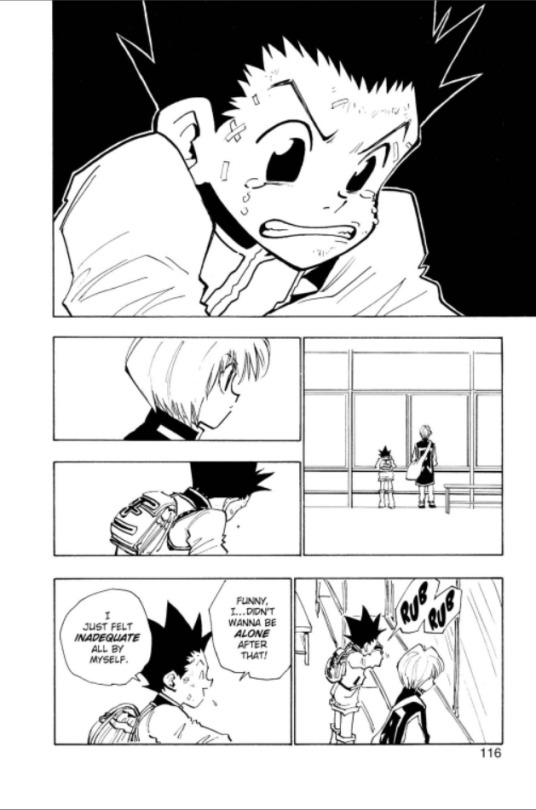
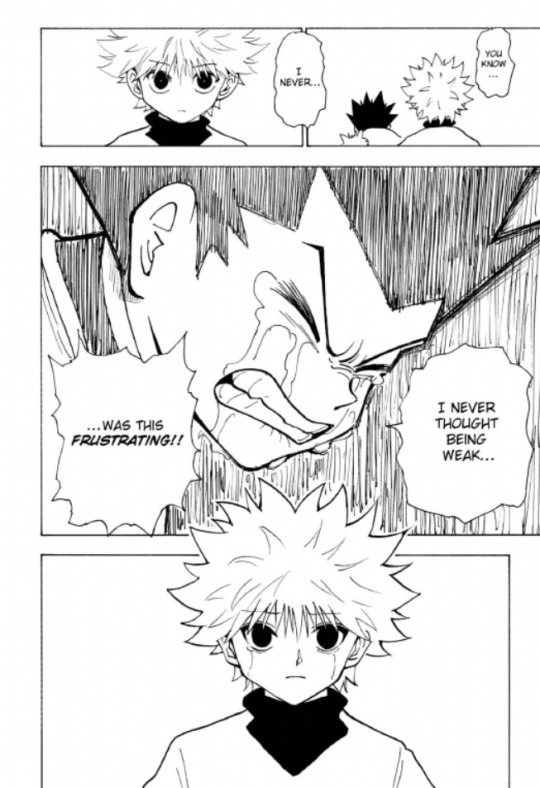
Also yet again (back to my usual refrain), this is in fact another subversion of shounen expectations. Shounen protagonists tend to be energetic and feisty teen boys who throw themselves into dangerous situations easily, and in most shounen series this is a trait that's not treated with much weight--they can handle it, nothing truly bad generally happens to them as a result, this trait of theirs is treated as something brave and admirable and "cool."
But with Gon, Togashi does give it weight--others worry about him and comment on this trait of his, his recklessness has real costs for him that escalate over time (think about the results of Gon tailing Hisoka in the Hunter Exam, Gon vs Gido, the end of Greed Island, and of course CAA), and ultimately his disregard for his own worth and safety essentially leads him to throw away his own life. In Gon, it's not an admirable trait, but a concerning and tragic one, with deep roots in his psyche.
It's brilliant to me how many of Gon's traits all link together--his low self-esteem comes from his abandonment issues and leads to his recklessness, he has a selfish streak because he's young and still somewhat immature and grew up isolated, and his short-sightedness as a result of that manifests in his sense of morality not being fully developed. And yet even with all of that, he's still a sweet, cheerful, kind, smart, and encouraging boy. I absolutely love the complexity of his character and how, if you carefully analyze him, the way he is makes so much sense.
Thank you for asking!
62 notes
·
View notes
Text
Reylo Scenes: TLJ
Rian Johnson gets loud vocal dislike for trying to make part 2 to JJ Adams film and his treatment of Luke Skywalker. Now I'm going to be honest..... Star Wars fans complain. That's part of the passion of it all. I guess. One area that he did succeed in was Reylo. He dealt with it with complete mastery. His invention of the forceskype or forcetime which allowed the protagonist and antagonist to actually talk was genius.
To add, I read the novelization which does expand on the story overall and it's great to read. There are comics as well. All which expand on the story.
Rian Johnson also is due a thank you for this moment.
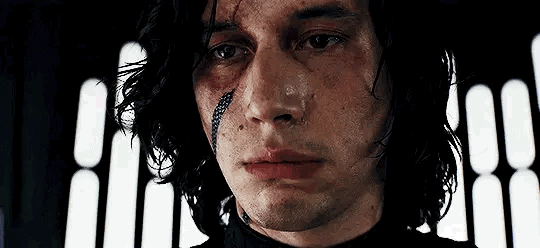
We'll call this no-more-daddies-Ren. That face should not be covered up.
Romance has always been apart of Star Wars. Yet, in the sequel trilogy there was this hyper paranoia of anything feminine and so anyone who sensed a romance happening I guess was just an unhealthy fool.
From a pure storytelling stand point, the dynamic between the hero and the villain is genuinely interesting. The fact that they are Ying Yang, alike but different, bonded yet on opposing sides and they attracted to one another only adds to the drama. It's the richest dynamic of the sequel trilogy.
So to all the Reylo haters

In the first forcetime scene the rules of the forcetime get established. Rey can't hurt him physically (yet) and Ren can't jedi mind trick her.
The production team continued to show their balance yet opposition. When Rey wakes up the warm sunlight is on her face and her smooth cheek. In Ren's scene the light on his cheek is mechanical and the skin is scarred. Rey is surrounded by nature. Ren is surrounded by technology. They both have a childlike innocence to them. Something is happening to them that had never happened before. Something unique even amongst force users. Ren is curious. Rey is just pissed off.
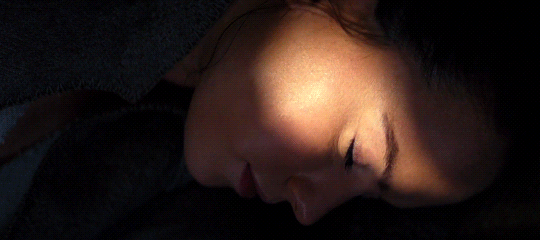
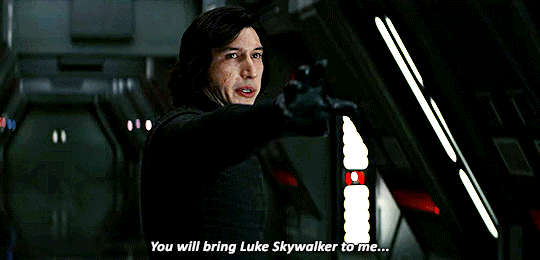
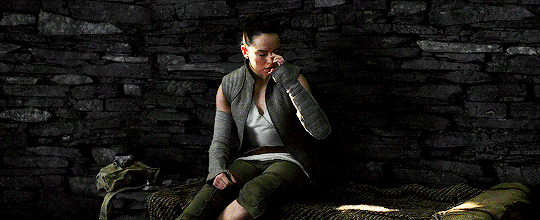
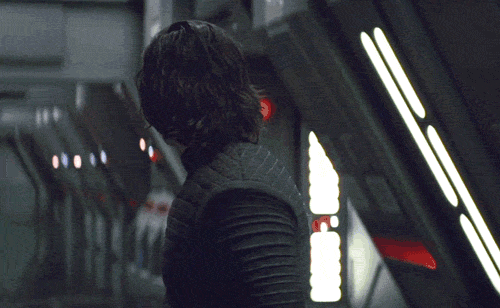
Ren is a man who feels very let down/betrayed by everyone in his life so by the time we meet him in The Force Awakens he doesn't want or need anybody. Within his comic Ben Solo is described as someone that everyone, including his peers, watched for signs of darkness. He's a bitter, hurt and jaded young man.
Rey is the denial queen. She has a childlike way of thinking that is purely optimistic. She latches onto people very quickly Finn, Han Solo, Chewie, Leia, Luke on and on. She understand the stories of the resistance, Luke Skywalker and Darth Vader, but doesn't understand any of the complexities. She's a very 'this is the truth as I know it so it must be the truth' kind of person.
When we arrive at the second Forcetime.
Rey overlooking the ocean. Ren overlooking the first order. Ren begins hearing the ocean waves. Rey begins to hear the snap of electricity. Ren sensing her turns and Rey, sensing him, adjusts and there they are.
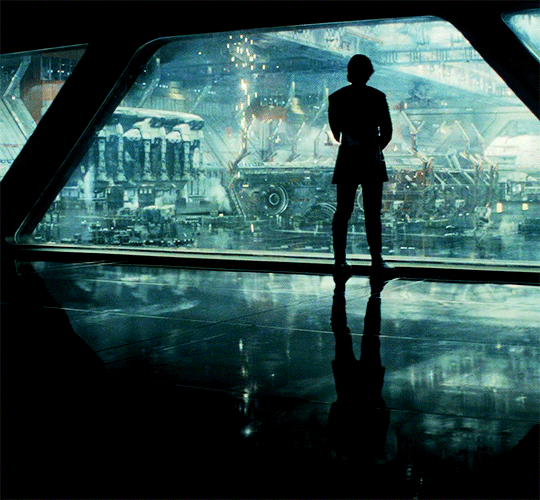

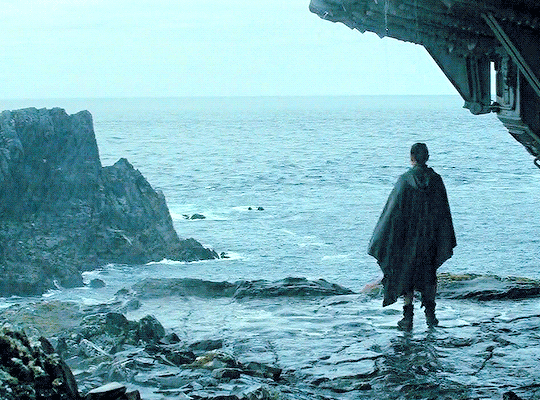

Rey, understand that she can't physically act out her anger against, verbalizes it. She's angry, but she wants the anger to be simple and it's not. He is tied to her in a way in some way.
What's interesting is Ren is very open to her in wondering why the force is connecting them. In the book Rey describes his eyes as hungry. Also, Ren wants to be understood by her. He uses this moment to reach her and get someone to understand a portion of how he became the man he is. The audience sees him approach her, get into her space, challenging her emotionally, physically and her ideas about him.
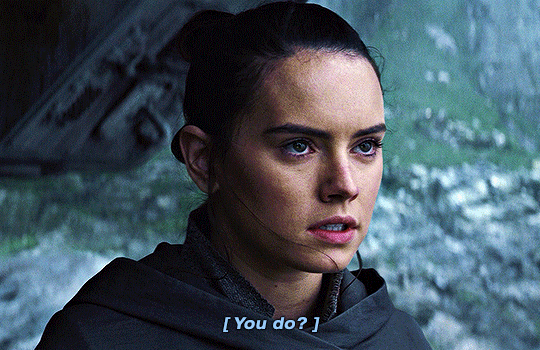

"ah, you do" if it's possible to verbally create a orgasm....Adam driver accomplished it for women. It doesn't hurt that these two seem to always be eye fucking each other. The intensity in which they lock onto each other and don't pay much around them any mind. The actors writers dream of.
The scenes serves a purpose though. Kylo is once again shift from simple bad guy to complicated bad guy/human being. She doesn't know everything. In the mix of all of this is her experience with Luke. She disillusioned and she's disappointed with Luke. Her experience is shifting her to understand Kylo's position more.
Which leads to their third forceskype aka shirtless Ben
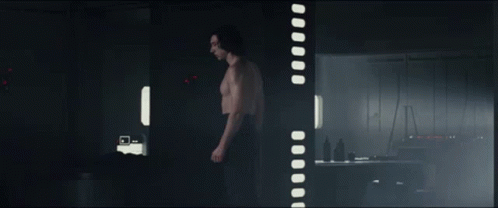
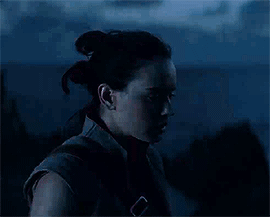
Rey, girl, you're not asexual. It's the first where we see she does have a reaction to him physically. She opens herself to understanding. She wants to know if he had a good reason for killing his father. She also expresses her jealousy of him. He has a family, he had a father who loved him. She would give anything for that. Kylo is also expressing his pain and how relates to her. They both feel abandoned by their parents. Kylo wasn't abandoned in the way Rey was, but he feels abandoned. Kylo looks at Rey like 'hey you don't see the similarities between us?". You also being to understand Kylo Ren's need to embrace the dark side because everyone on the light side failed him.

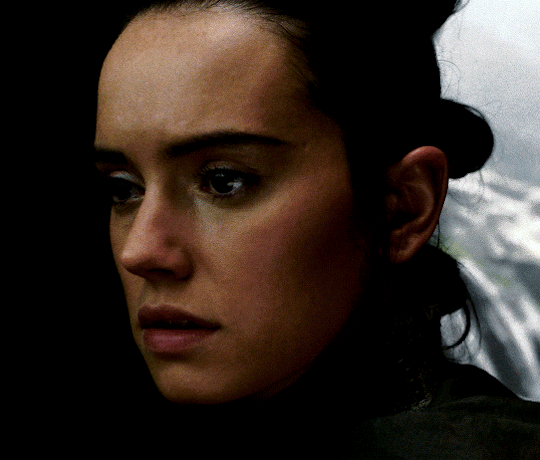
Part of her journey in The Last Jedi is about embracing her womanhood. After the force bond with the shirtless Kylo Ren. She goes to the dark sided vagina cave. She jumps in and when she emerges her childhood hair buns are gone. Rey enters in this vision and looks for answers as to who/where her parents are. Nothing is revealed to her. She didn't find the answers she was looking for and the hope that she will find them goes out of her. In this moment she's desperately lonely. Here our hero spiritually seeks out through the force bond the one individual she feels will relate to her, our villain.
Why do people call this scene "The Finger Touch Love Scene"

Cause the level of intimacy these characters reach without many words and without being lewd. Rian Johnson, bravo!
The way Kylo Ren is just present, reassuring and nurturing as Rey relays her trip into the dark cave. This is a moment where he could stoke her negative emotions to the dark side. He doesn't though. He's completely emotionally present for her. Kylo Ren sits within his ship in a area that's lit with a soft blue light as he reaches towards her he's in the warm of the firelight. Now he is physically present for her.
Rey is completely raw. She's allowing herself to be seen emotionally naked. This is the first scene where she gives him something with free will. She gives him union.
She reaches out from underneath the blanket. He takes his glove off and they slowly, innocently, reach for each other. The eye contact they maintain as the force theme begins, we as the audience understand something profound is happening. Within them, in this moment, there is a balance in the force.
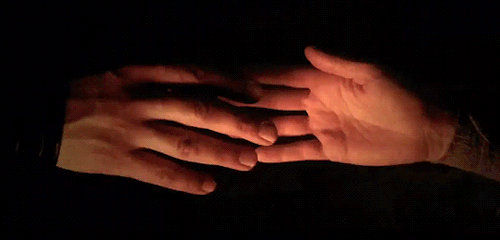
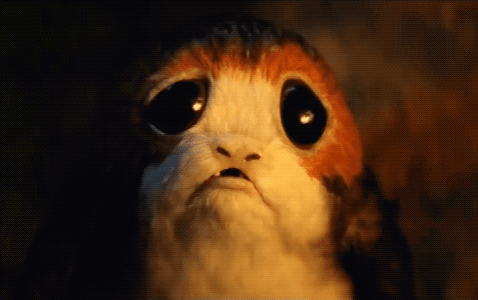

They both have a vision of one another. Ren sees her past. Rey sees a glimpse of his future. This is the moment for Reylo, they both said to themselves "we're never letting this go". Rian Johnson confirmed it's from this moment that Ren decides to kill Snoke because that's the only way to protect Rey from him. Rey shift her belief system to complete Team Ben. She doesn't have a plan when she goes to meet Ben within the First Order. She just has complete faith in him that when the moment matters he'll stand by her.
We arrive at the elevator scene and just prior when she arrive onboard the supreme in a coffin from the Falcon that has his calligraphy on it. It's their first interaction after that intense force bond.
She expresses her faith in him and the possibility of a future. This is the first scene where she walks up on him. She wants that closeness and connection now. He's closed off we come to understand later, he's become he's protecting his mind from Snoke understanding his true intentions. They both express what they saw in their vision and conviction that one will join the other. It's canon that in this moment Kylo Ren wanted to kiss Rey.
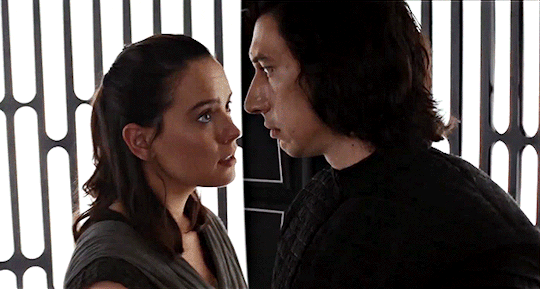
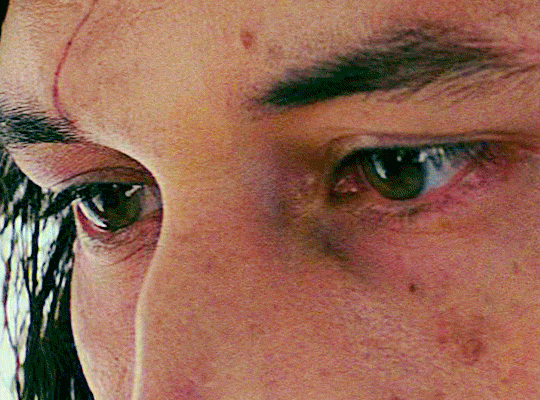
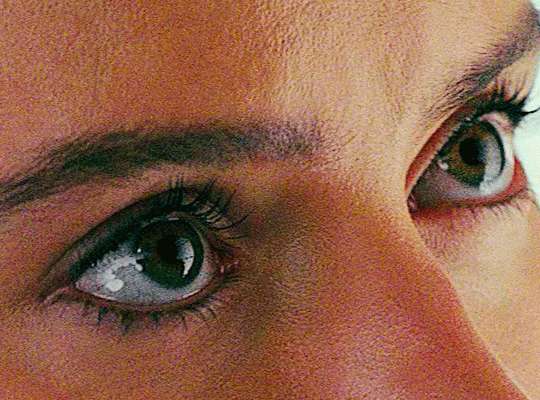
Snoke - It's not his story. Kylo Ren looked like a badass killing him. That's all we needed you for boo. However, I did enjoy the internal dialogue of Snoke that the novelization affords. Through the force Snoke can feel Kylo Ren's need for approval which is something that frustrates him. He can feel his conflicted nature for Rey and for the light. He can feel his pain and confusion when Snoke says he bridged their minds (he didn't). That was enlightening.
My favorite moment is right after Kylo kills Snoke and Rey and Kylo looks at each like
"You with me?"
"Yeah, I'm with you"
And they turn to face the pretorian guards. They are with each other, but they do have a misunderstanding on what that means.


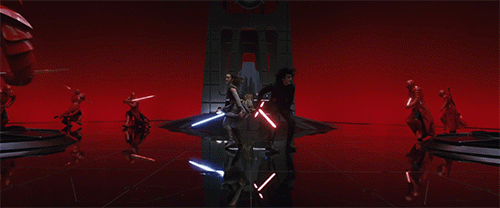
The fight scene is great and beautiful. Kylo Ren is a supportive partner to her and she to him. Kylo support her body with his and he takes on the majority of the Pretorian guards. He has a moment when he checks in on her, she get's hurt, he's upset and scared but then centers himself. When he's in trouble she supports him. It's described in the novel that they can feel each other's emotions through the force.
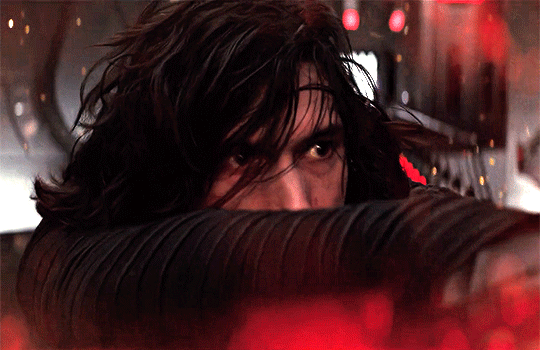
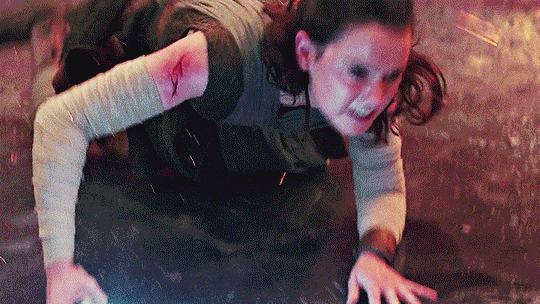
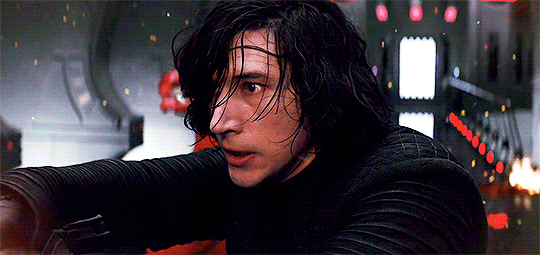
(Couldn't find the gif of her getting cut)
#star wars#ben solo#reylo#finnrey#rey skywalker#rey star wars#kylo ren#kylo x rey#ben solo deserved better#ben solo x rey#ben solo lives#rey
65 notes
·
View notes
Note
I’m loving hearing everyone’s thoughts on whump. Many such cases of ostensibly straight or bisexual women consuming nothing but torture porn (with a tasteful side of woobie coddling or “caretaking”) for gay male pairings almost exclusively. Extreme rambling below because I’ve been thinking about this forever and I’ve never seen anyone else talk about it in a meaningful way.
The non-sexual elements of whump are actually even more interesting to me, especially since even that is still reserved for gay male characters (or straight male characters being written as gay for fic). The whole caretaking part, the way so many whump writers often deride canon material for failing to properly explore the sort of pain they think their fandom faves ought to feel (more accurately: exhibit). Many whump fics are non-sexual but the voyeuristic attention to the suffering of its gay male protagonists feels sexual, in a fetishistic way. There is no similar equivalent to people paying this much precious, mawkish attention to the traumas experienced by female characters. Even if it mirrors or exceeds the actual amount of canon emotional catharsis experienced by their male counterparts.
And I really don’t think these women are a 1:1 equivalent to men who can only get off watching extremely violent porn about women. I don’t even think it comes close to the level of harm those men cause. But I would like to ask the people who consume and produce this content: Why is it only ever about gay men? Why is suffering, crying, rape, terminal illness, torture, etc. such a heavy erotic fixation for them?
And unfortunately I cannot picture any response that isn’t either 1) pornsick or 2) violently defensive.
Very eloquently said. In my experience, aside from admitting that it’s a fetish or misogynistically claiming that male characters are more complex and easier to empathize with, the most common answer I’ve received to the question of why this community focuses almost exclusively on male characters is that it’s an “unexpected and intriguing reversal of gendered expectations.” And while this may be true for some, I’m not convinced this is the main reason.
Because obviously, having a female character abuse and torture the male character would also constitute as an unexpected reversal of gendered expectations, but this community isn’t fascinated by that. Both the character executing the abuse, and the character receiving the abuse, are virtually always male—and the character who plays the role of the caretaker, of course. Coincidentally, I just ran into some stats which really emphasize the point, not that they were needed:
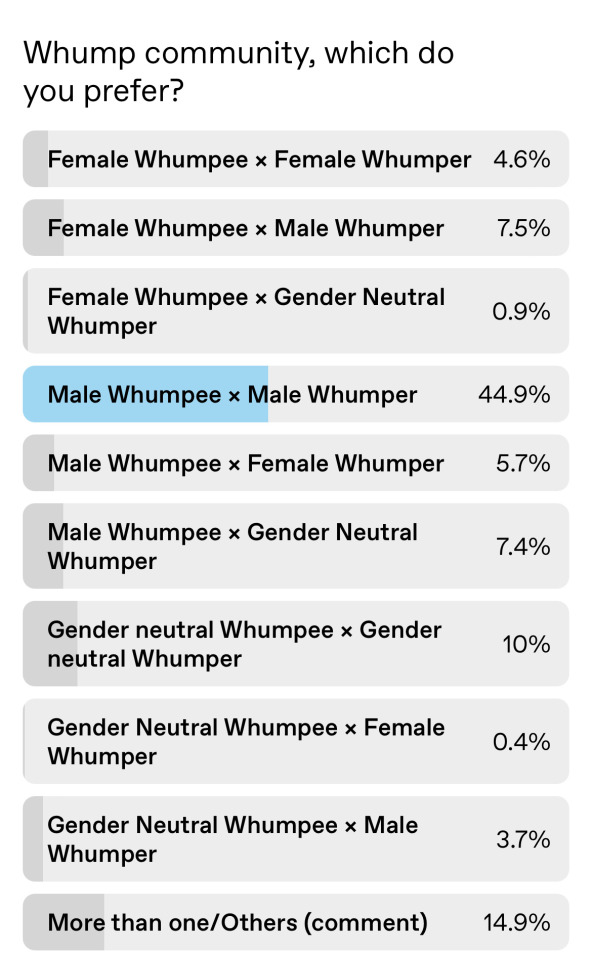
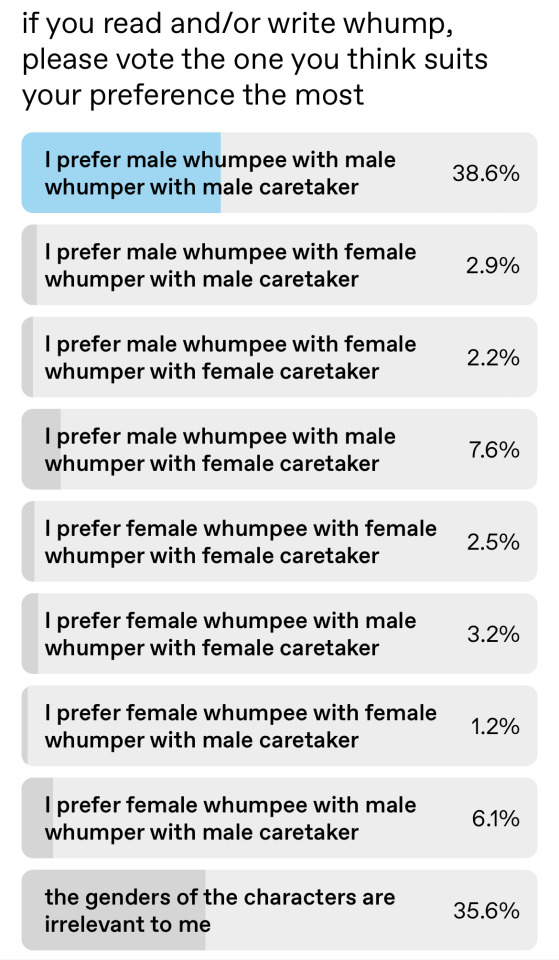
Also, have you noticed a strange upsurge in ridiculously abusive and shockingly violent homo-erotic media? I’m referring to stories like Killing Stalking or Hannibal here. Of course, these kinds of stories have always existed, but I feel like the fascination in them has recently spiked. I recall that even ten years ago the most popular media on gay male relationships was mawkishly adorable—what some would call “fluffy.”
You have to wonder how much of a role that plays in all this. I know for many girls, these vicious homo-erotic stories were their first real exposure to whump content. Maybe they prefer gay male whump content because it’s all they know? But again, that seems too convenient an answer.
In conclusion, I think this is just a mixture of fetishization and internalized misogyny, as I’ve said. In another post, I’ll go further into why I think it’s actually false to argue that male characters are more complexly written and easier to empathize with, and how the real culprit is not the writing, but gendered stereotyping and unconscious misogyny.
If anyone wants to chime in and give their perspective on this, please do.
#terfblr#radical feminism#terfsafe#radblr#gender critical#radical feminist safe#misogny#sexism#gender abolition#whump community#whump#internalized sexism
29 notes
·
View notes
Text
𝕋𝕙𝕖 𝕄𝕠𝕥𝕙 𝕒𝕟𝕕 𝕥𝕙𝕖 𝔹𝕖𝕒𝕣
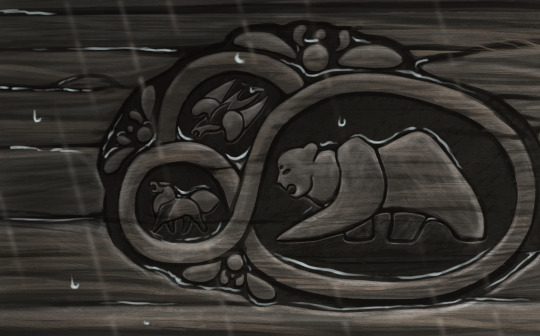
~Frequently asked questions~
Wondering what the hell that human-faced bear monster was that you saw on your dash? Can't figure out whether it's supposed to be scary or cute? Confused deeply?
Well do I have the solution for you: All your questions answered, and more!
First of all: what am I looking at?
uh... well, the creatures are called Kanai. They're basically a sphinx, a creature with a human face, but instead of the body of a lion, it's a bear! It's not that weird! (right?) Oh, and they're also the size of a house. Don't worry about it, it's fine. It's fine.
What is this setting?
The story is set in my headworld, which is a sort of an alternate-reality Earth, and specifically in a country called Kellabor. Here's a big worldbuilding dump if you're curious, but there's no need to read it all before diving into the books. You'll discover everything important along the way.
So there are books?
Yes! I've published two books in the series, and I'm working on the third. I have a masterpost explaining them with content warnings here.
Okay but what is the story, really? What happens?
It's a very PG slow-burn fantasy romance adventure story with a dash of horror.
Oh, so there's romance?
Yep! It's been planned that way since the first words I put down. If you get through the first two books and are wondering where the hell the romance happens, just remember: it's a slow burn. A sloooow burn. We'll get there.
How many books are there going to be?
So far, I'm planning on four. Originally, I had three planned, but the second one was getting too long and I had to split it in half. That's why book II: The Crossing ends on a cliffhanger. Don't worry, it's not going to take four books to get to the cute parts.
Is there going to be a happy ending?
Yes! Yes, I promise there will be a happy ending. Might not, uh... seem very likely, at times, but yes.
What's the inspiration behind this story?
If you want a long somewhat-spoilery answer, you can read this, but the tl;dr non-spoilery version is:
I wanted to write a story about a monster and a human where the monster is the one facing the ethical dilemma, and they come to be friends and care about each other. And go on adventures. And love each other.
Wait, so... are the giant bear monsters the good guys?
Um... yes and no. There really aren't clear good guys or bad guys in this story. I'm going to have to ask you to have a bit of an open mind, here.
Okay, but I swear I saw a gif of one of these monsters eating someone. Was that from this?
Yeah, that gif is from a side-project set in the same world. It's a little more explicit than anything that happens on screen in TMatB, but let's just say it's not... uncharacteristic. That's the dash of horror I mentioned.
Listen... it's the dash of horror that makes the cute stuff that much cuter. The horror is the flavor. Trust me on this one.
Wait so if the bear monsters eat people, how are they not obviously the bad guys?
It's complicated! You'll find nothing is black and white here in Kellabor. The country has a long, mysterious, complex history, and so do each of my characters.
Okay but... what happens, though? Who's this girl I keep seeing in these drawings? Why does it sometimes seem like they are enemies and sometimes not?
The protagonists start out in conflict in book I due to ✨circumstances✨. They have a lot of issues to work out. Depending on where they are in the story, drawings of them might show them being more antagonistic or more sweet. It'll all make sense with context.
I'm still confused...
Ask box is always open! ♥️
71 notes
·
View notes